Included in a recent donation was a memorial written by Ormidale in 1798. We have serialised this so you can read through at your leisure – enjoy!
Below we bring you, bit by bit, a memorial that Ormidale wrote in 1798 laying out his grievances against his brother (“the late Otter”) in an attempt to have his will overturned. We have done our best to decipher Ormidale’s scrawl but please feel free to offer corrections of any word you think we have misread. We are quite sure that there will be a few.
Excerpt 1
We are particularly keen to hear suggestions for the word before “Intaill” in the second last line.
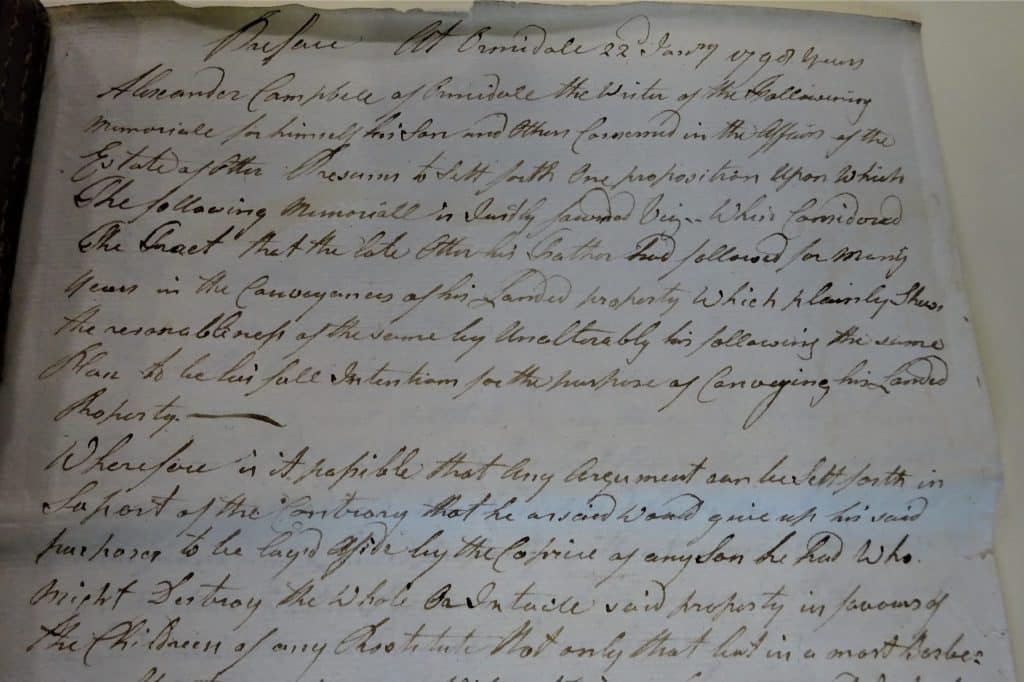
Preface At Ormidale 22nd January 1798 Years
Alexander Campbell of Ormidale the Writer of the Following
Memoriall for himself his Son and Others Concerned in the Affairs of the
Estate of Otter Presums to Sett forth one proposition Upon Which
The following Memoriall is justly faunded Viz in When Considered
The Fact that the late Otter his Father had followed for Many
Years in the Conveyances of his Landed property Which Plainly Shews
the reasonableness of the same by Unalterably his following the same
Plan to be his full Intention for the purpose of Conveying his Landed
Property ————-
Wherefore it is possible that any Argument can be Sett forth in
Suport of the Contrary that he as said Would give up his said
purposes to be layed Aside by the Caprice of any Son he had Who
Might Destroy the Whole Oa Intaill said property in favour of
the Children of any Prostitute
Excerpt 2
Ormidale is saying here that Otter had no right to ignore their father’s wishes, no matter how badly the two had fallen out. He goes into much more detail about their differences later on in the memorial itself. You can see from this extract how difficult it is to understand documents which do not have modern punctuation, but instead rely on capitalising Important Words.
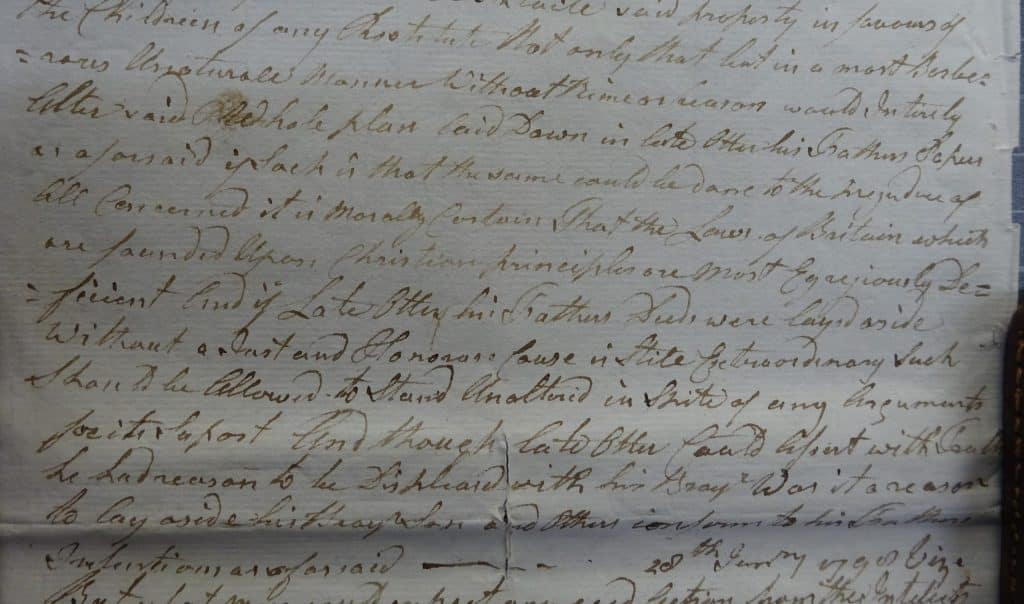
Not only that but in a most Barbe=
=rous Unaturall Manner Without Rime or Reason would intirely
Alter said Whole Plan laid down in Late Otter his Fathers Papers
as aforsaid if sach is that the same could be done to the prejudice of
All Concerend it is Morally Certain That the Laws of Britain which
are founded upon Christian principles are most Egregiously De=
=ficient And if Late Otter his Fathers Deeds were layd aside
Without a Just and Honorous Cause is Still Extraordinary Such
Should be Allowed to Stand Unaltered in Spite of any Argument
for its Suport And though late Otter Could Asert with Truth
he had reason to be Displeased with his Brother Was it a reason
to lay aside his Brother and Son and Others conform to his Fathers
Interest as aforesaid
Excerpt 3
Here, Ormidale is not holding back in the slightest on his opinion of his brother! We spent some time wondering who Robert Spiers might be, but the inclusion of the name Marrat led us to that lightbulb moment. It’s a mondegreen, a mishearing or misinterpretation of a phrase in a way that gives it a new meaning. Mr Robert Spiers is in fact Robespierre – Maximilien François Marie Isidore de Robespierre, one of the leaders of the French Revolution. Marrats was of course Jean-Paul Marat, a fellow revolutionary, who was assassinated in his bathtub.
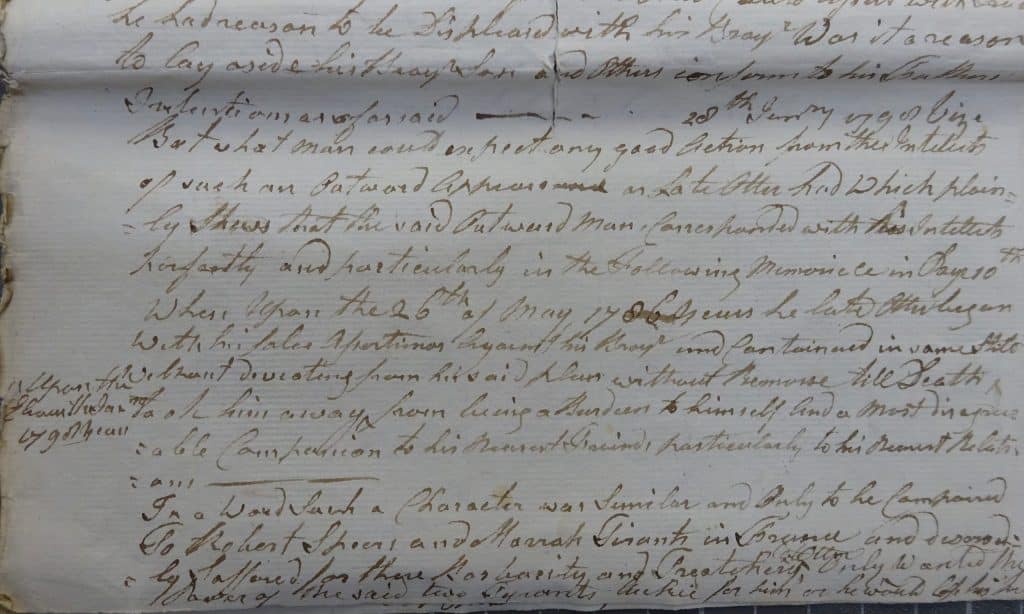
—————— 28th January 1798 Viz
But what man could expect any good Action from the Intillicts
of such an Outward Appears as Late Otter had which plain=
=ly Shews that the said Outward Man Corresponded with his Intillicts
perfactly and particularly in the Following Memoriall in Page 10th
When Upon the 26th of May 1786 Years he late Otter began
With his false Assertions Against his brother and Containued in same Stile
Upon the Without deviating from his said plan without Remorse till Death
Eleventh January took him away from being a Burden to himself And a most disgrace=
1784 Years =able Companion to his Nearest Friends particularly to his Nearest Relati=
=ons ———————-
In a Word Such a Character was Similar and Only to be Compaired
To Robert Spiers and Marrats Tirants in France and deserved=
=ly Saffered for there Barbarity and Trearchery , late Otter only wanted the
Power of the said two Tyrants luckie for him or he would lose his head
Excerpt 4
Here we have Ormidale starting to write the memorial itself. It’s quite an unusual document and is a good example of how you can find family history information in unexpected places if you just keep digging. It’s also an example of how people make mistakes. Uncle Alexander joined the Earl of Argyll’s rebellion in 1685, not in 1785.
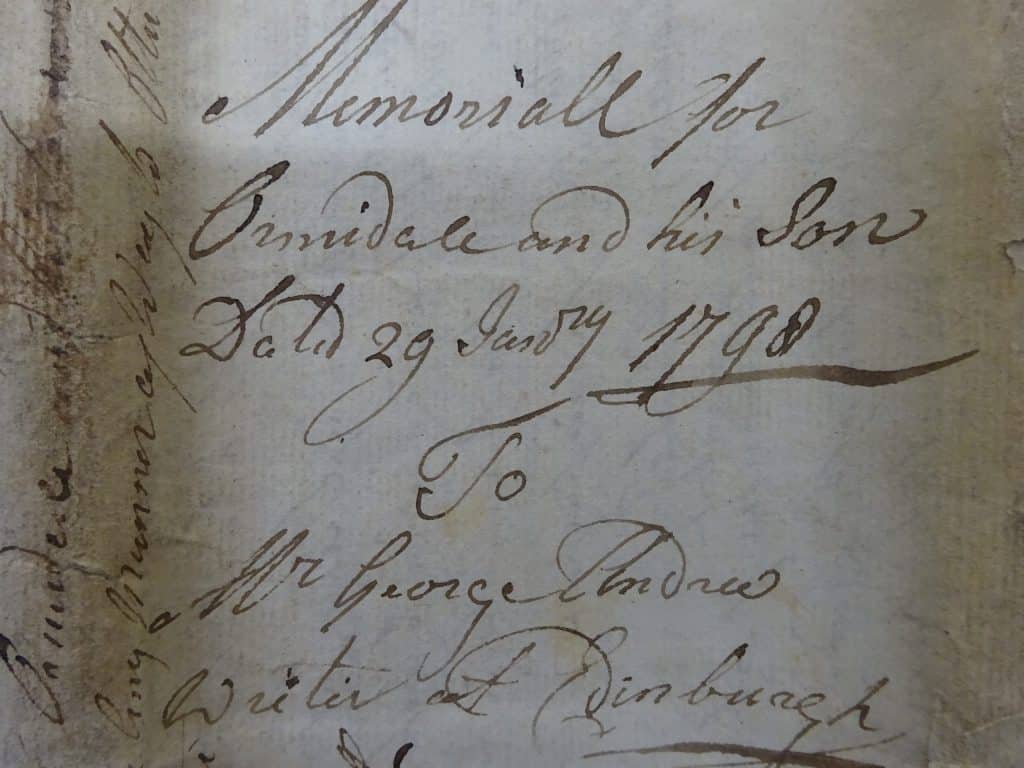
Memoriall for
Ormidale and his son
Dated 29 January 1798
To
Mr George Andrew
Writer at Edinburgh
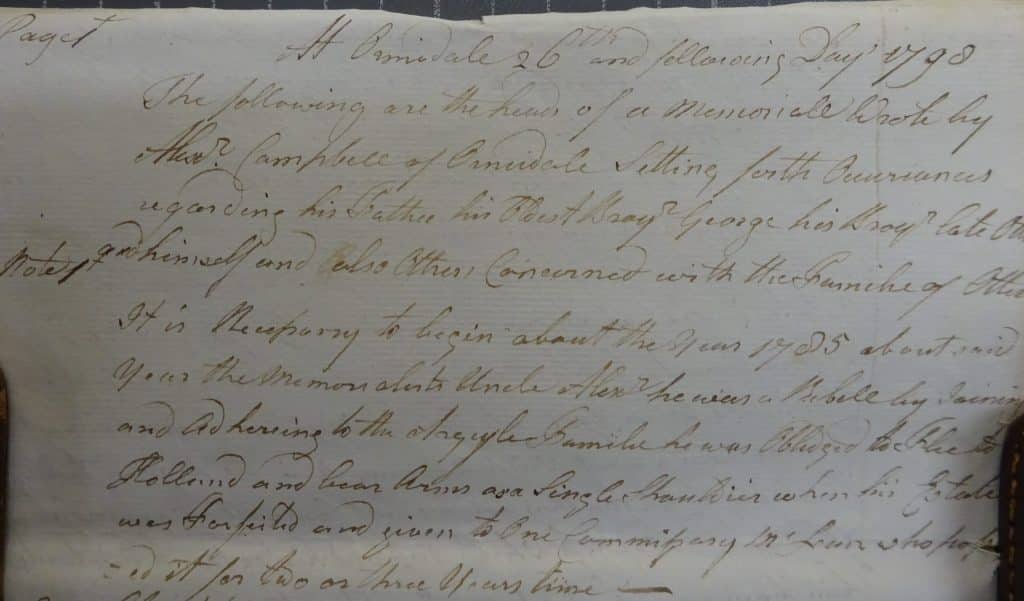
Page 1 At Ormidale 26th and following day 1798
The following are the heads of a Memorial Wrote by
Alexander Campbell of Ormidale setting forth Grievances
regarding his father his oldest brother George his brother late Otter
and himself and also Others concerned with the Familie of Otter
Note 1
It is Necessary to begin about the year 1785 about said
Year the Memorialists Uncle Alexander he was a Rebell by Joining
and adhering to the Argyle Familie he was obliged to Flee to
Holland and bear Arms as a Single Shouldier when his Estate
was forfeited and given to one Commisiary McLean who possess=
=ed it for two or three years time
Excerpt 5
At this period landowners were able to choose the minister for their parish, with Kirk members having no say. People were deeply unhappy about this state of affairs and it led to some ministers leaving the Established Church and forming Secession Churches. It eventually led to the Great Disruption of 1843, when the Free Church was formed.
It was common for younger sons of landowners, i.e. those who would not inherit the estate, to go into the clergy or the military, which is what has happened here. Then, when his older brother died, John Campbell became heir to the estate.
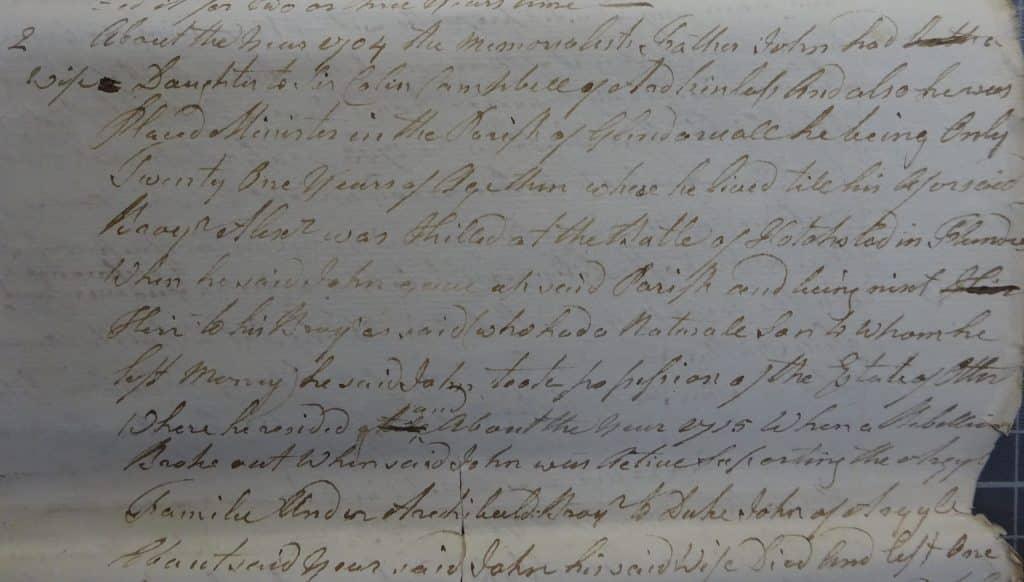
2 About the year 1704 the memorialists Father John had a
Wife daughter to Colin Campbell of Ardkinglas and also he was
Placed Minister in the Parish of Glendaruel he being only
Twenty One Years of Age then where he lived till his aforesaid
Brother Alexander was killed at the Battle of Hotchstad in Flanders
When the said John gave up said parish and being nixt
Heir to his Brother as said (who had a natural son to whom he
left money) the said John took possession of the Estate of Otter
Where he resided and about the year 1715 When a Rebellion
Broke out When said John was Active supporting the Argyle
Family under Archibald Brother to Duke John of Argyle
About said year said John his said wife died and left one
Son named George and one daughter afterward married to late
Mr Campbell of Southhall
Excerpt 6
Again, this extract shows how detailed family history information can be found in unexpected places. In this example we also have some information about teachers at Glasgow Grammar School.
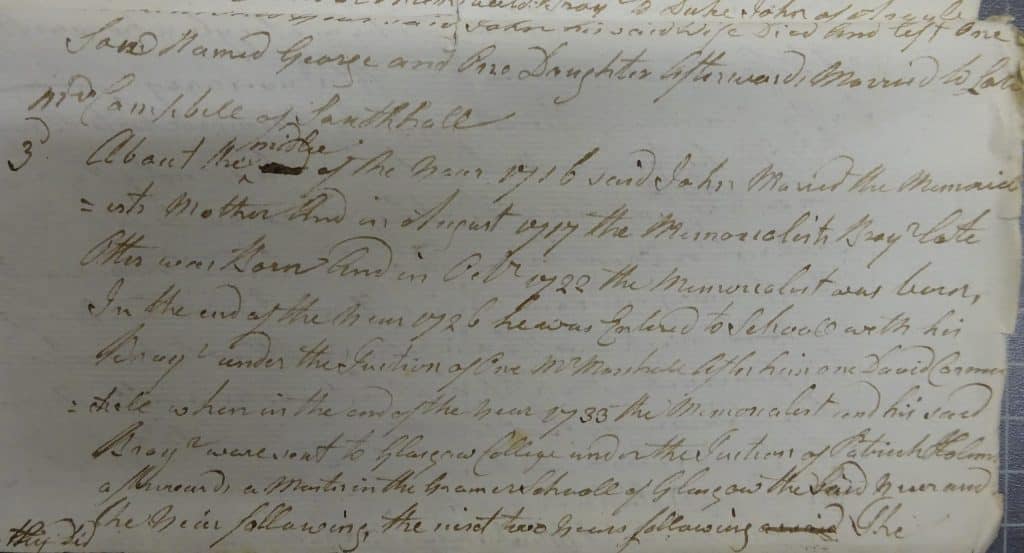
3d About the middle of the year 1716 said John married the Memorial=
=ists mother And in August 1717 the memorialists brother Late
Otter was born And in December 1722 the Memorialist was born,
In the end of the year 1726 he was entered to School with his
Brother under the Tuition of One Mr Marshall after him one David Carmi=
=chell when in the end of the year 1733 the Memorialist and his said
Brother were sent to Glasgow College under the Tuition of Patrick Holmes
afterwards a Master in the Grammar School of Glasgow the said year and
(as they did) The year following, the next two years following The
Excerpt 7
We’re not entirely sure what Ormidale is talking about here. George was the eldest brother. His mother was their father’s first wife Margaret Campbell, who was the daughter of Sir Colin Campbell of Ardkinglas and who died at a young age. John Campbell then remarried, and his second wife, Jane Stenhouse was mother to our two feuding brothers. Under the terms of Margaret’s marriage contract George was due to inherit certain lands. Ormidale seems to be saying that their father disinherited George and that Otter kept them. But we know that George inherited the lands of Ardmarnock, and Ormidale refers later in the memorial to Otter’s Nephew, Ardmnarnock. We also know that their father gave Otter certain rights under the old feudal system that forced Orimdale to make payments to him for the lands of Ormidale, and that this caused financial trouble for Ormidale. It may be that a similar arrangement was made for the Ardmarnock lands and that this is what Ormidale means when he says that Otter “ruined” George.
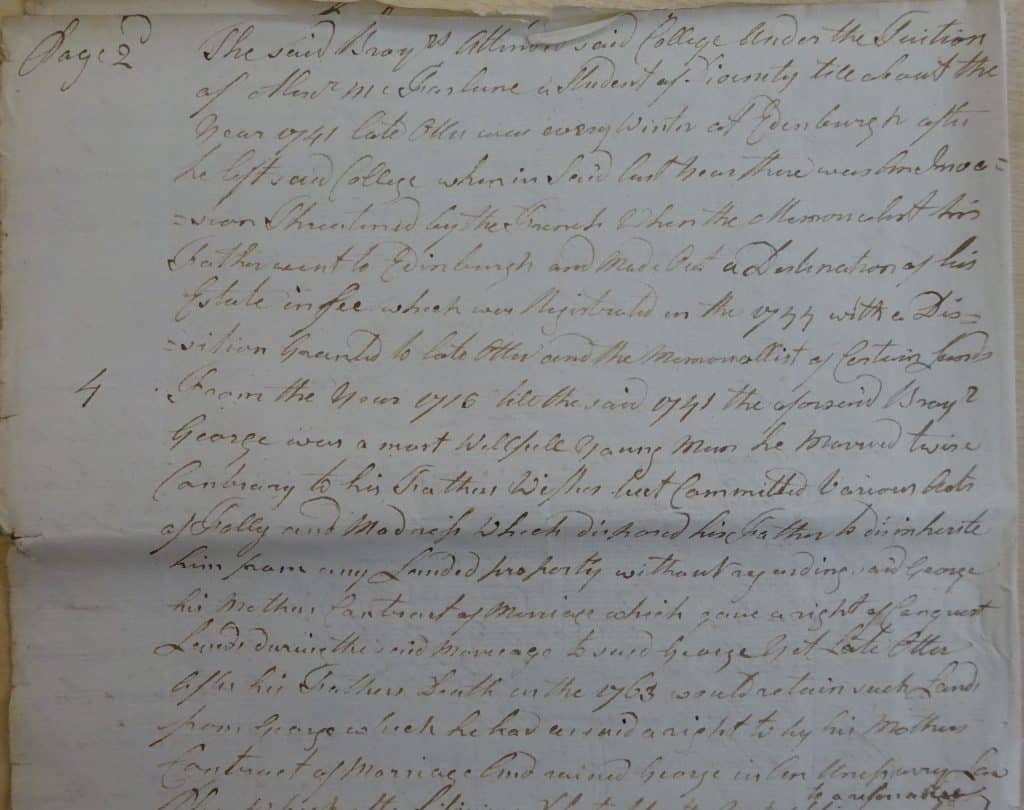
Page 2nd
The said brothers attended the said college Under the Tuition
of Alexander McFarlane a Student of Divinity till about the
Year 1741 late Otter was every winter at Edinburgh after
he left said college when in said last year there was Ane Inva=
=sion Threatened by the French when the Memorialist his
Father went to Edinburgh and made out a delineation of his
Estate in fee which was Registered in the 1744 with a Dis=
=sition Granted to late Otter and the Memorialist of Certain Lands
From the year 1715 till the said 1741 the aforesaid Brother
George was a most willfull young man he married twice
Contrary to his Fathers wishes but committed various Acts
of folly and madness which disposed his father to disinherit
him from any landed property without regarding said George
his mother’s contract of marriage which gave a right of Conquest
Lands during the said marriage to said George Yet Late Otter
After his fathers death in the 1763 would retain such lands
from George which he had as said a right to by his Mothers
Contract of Marriage and ruined George in len Unessarry Law
to a referative
Plea which after Litigious Dibator before the Court of Session was assured ^
Excerpt 8
Ormidale is of course talking about the second Jacobite Rebellion here, and we can see exactly what he means when he complains about Otter’s temper. He’s at Inveraray, home to the Duke of Argyll who was on the side of the government, and threatens to join the other side because his nose was out of joint. Possibly not the most sensible move?
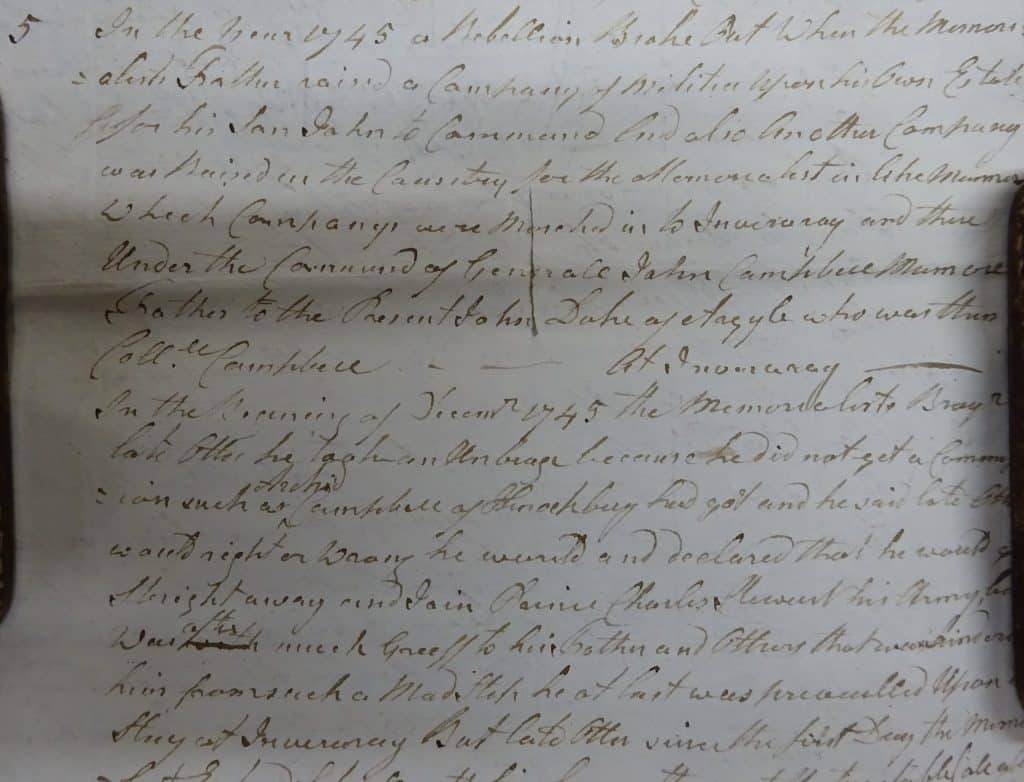
5 In the year 1745 a Rebellion Broke Out when the Memor=
=ialists Father raised a Company of Militia upon his own Estate
for his son John to Command and also another Company
was raised on the Cauntey for the Memorialist in like Manner
Which Companys were Marched in to Inveraray and there
Under the Command of General John Campbell Mamore
Father to the present John Duke of Argyll who was then
Collonell Campbell ——- At Inveraray ————-
In the Beginning of December 1745 the Memorialists Brother
Late Otter he took an umbrage because he did not get a Commiss=
=ion such as Archibald Campbell of Knockbuy had got and he said late Otter
would right or wrong he went and declared that he would go
straight away and join Prince Charles Stewart his Army, but
was after much Greeff to his brother and others that were hindering
him from such a Mad Step he at last was prevailed upon to
Stay at Inveraray
Excerpt 9
Here you can see the protocol of using the last word on one page as the first word on the next. It shows that no page is missing. We can also see how eighteenth century spelling can make reading comprehension a bit trickier, especially when taken in conjunction with the old letter forms and just plain old bad handwriting.
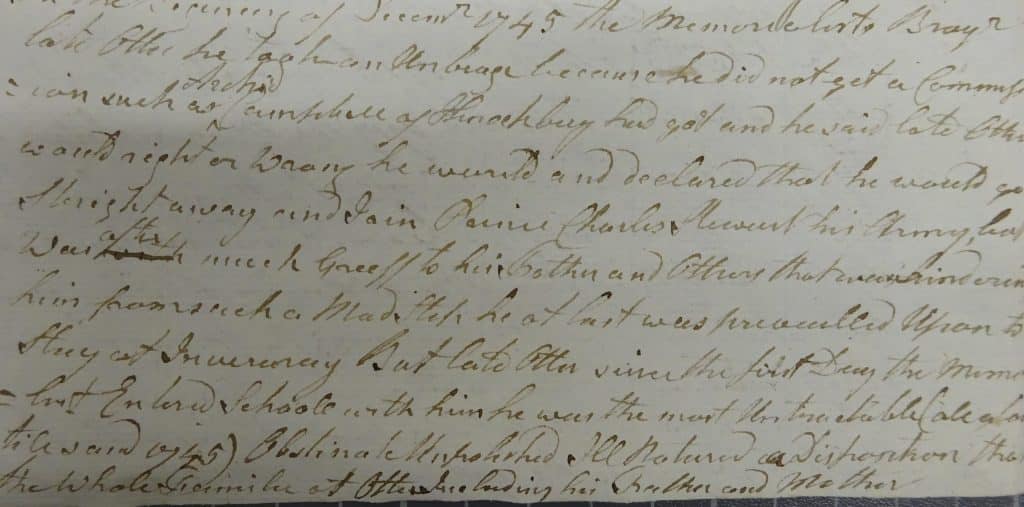
But late Otter since the first day the Memori=
=alist Entered School with him he was the most untractable (all about
till said 1745) Obstinate Unpolished Ill Natured a Disposition that
the whole Familie at Otter including his Brother and Mother
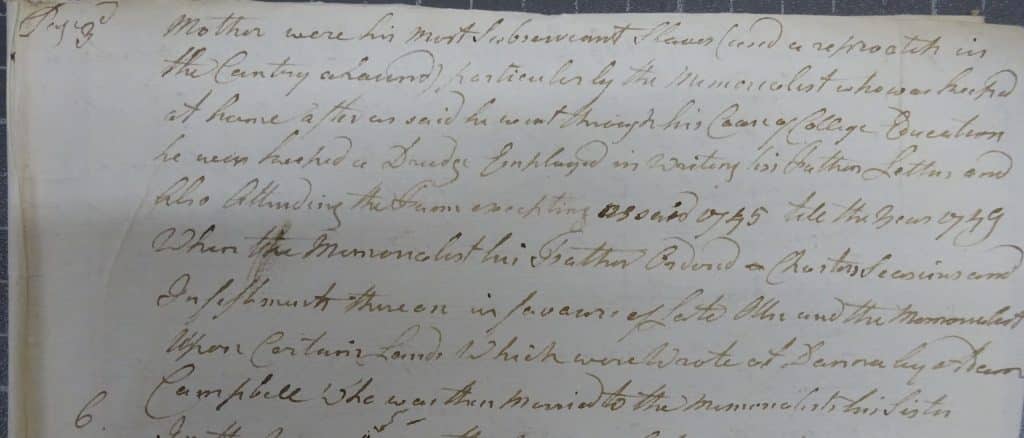
Page 3rd
Mother were his most subservient slaves (and a reproatch in
the Cantry around) particularly the Memorialist who was keeped
at home after as said he went through his Caurs of
College Education he was keeped a Drudge Employed in writing his Fathers letters and
Also attending the Farm excepting as said 1745 till the year 1749
When the Memorialist his Father Ordered a Charter Sasine and
Infeftment thereon in favour of late Otter and the Memorialist
Upon Certain Lands Which were wrote at Danna by Adam
Campbell who was then married to the Memorialist his sister
Excerpt 10
Again we see family history information that is not recorded in the standard records. The marriage of Alexander Campbell and Marion Campbell, daughter of John Campbell of Strachur, took place at Otter House in the parish of Kilfinan. The earliest surviving marriage register for that parish dates from 1779.
Vide means “see”, so Alexander is directing the reader to another memorial that he had written in 1795.
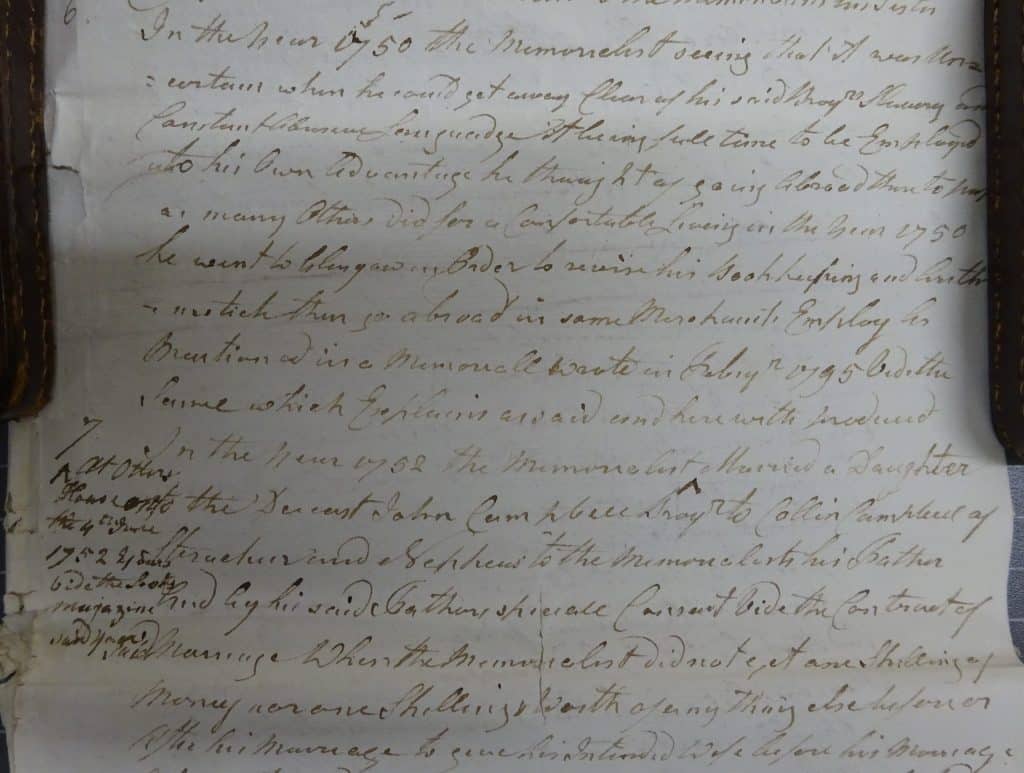
In the year 1750 the Memorialist seeing that it was Un=
=certain when he could get away Clean of his said Brothers slavery and
Constant Abusive Language It being full time to be Employed
to his own advantage he thought of going abroad there to work
as many others did for a comfortable living in the year 1750
he went to Glasgow in order to revise his bookkeeping and Arith-
-metick then go abroad in some Merchants Employ As
Mentioned in a Memorial wrote in February 1795 Vide the
same which explains as said and herewith produced
In the year 1752 the Memorialist married a daughter
To the deceast John Campbell brother to Colin Campbell of
Strachur and Seppeus to the Memorialist his Father
And by his said Fathers speciall consent Vide the Contract of
Marriage When the Memorialist did not get ane Shilling of
Money nor one Shilling worth of any thing else before or
After his Marriage to give his Intended Wife before his Marriage
Excerpt 11
This relates to what we were saying in excerpt 7, that Ormidale had to make payments to Otter (first of all to his father and then to his brother). He is complaining again about all of the work he had to do for Otter for no pay, having done the same for his father for many years, just on the promise from his father that one day the estate of Otter would come to him.
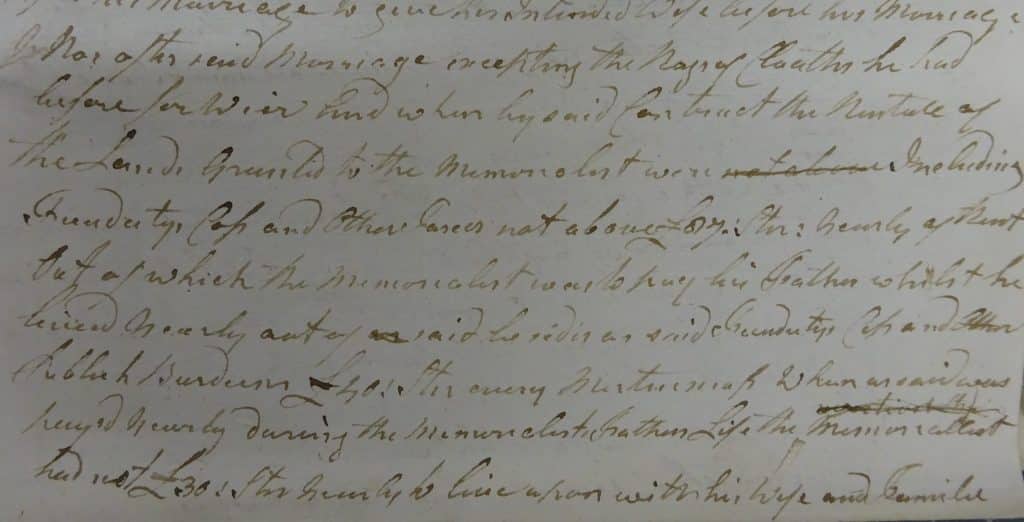
Nor of the said Marriage excepting the Bags of Cloaths he had
before for wier and when by said Contract the Rentall of
the lands granted to the Memorialist were Including
Feu Duty Cess and other taxes not above £87 Sterling yearly of rent
Out of which the Memorialist was to pay his Father whilst he
lived Yearly out of said besides as said Feuduties, Cess and Other
Public Burdens £40 l Sterling every Martinmas When as said was
payed yearly during the Memorialists Fathers life the Memorialist
had not £30 l Sterling nearly to live upon with his wife and Familie
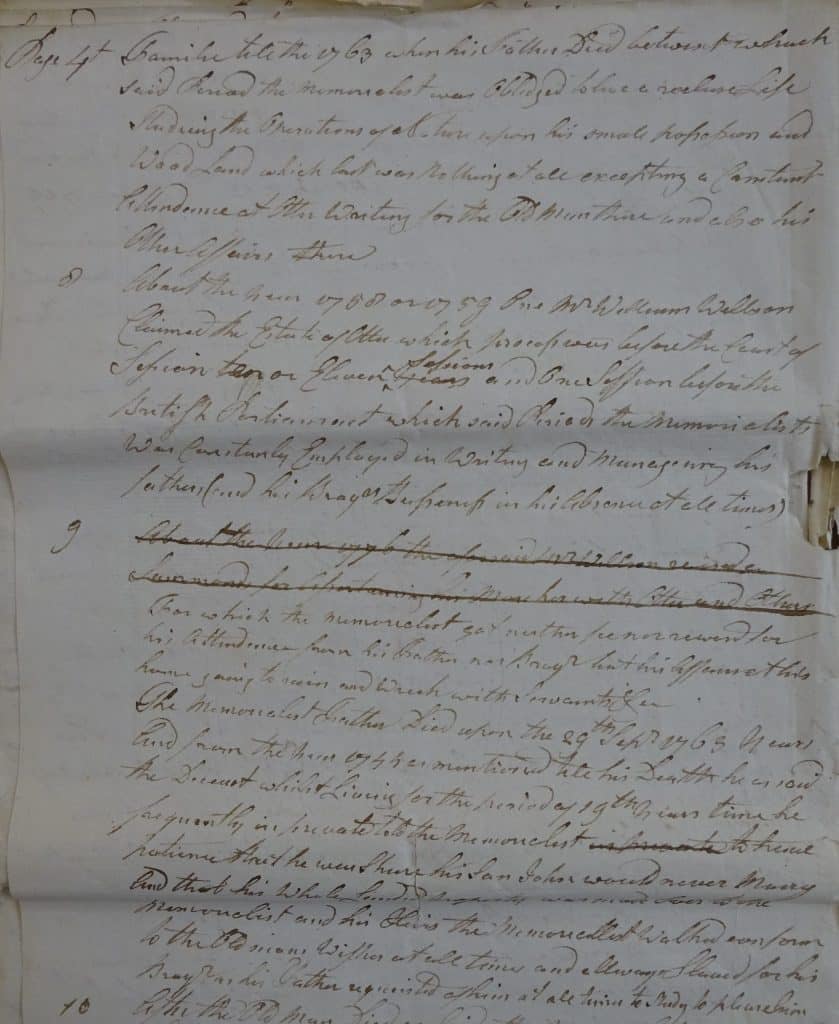
Page 4 Familie till the 1763 when his Father died betwixt which
said Period the Memorialist was obliged to have a recluse life
Studeing the operations of Nature upon his small properties and
Wood Land which last was nothing at all excepting a Constant
Attendance at Otter Writing for the Old Man there and also his
Other Affairs there
8 About the year 1758 or 1759 Mr William Willson
Claimed the Estate of Otter which processes before the Court of
Session ten or eleven sessions and One Session before the
British Parliament which said Periode the Memorialist
Was constantly employed in Writing and Managing his
fathers (and his brothers Stipends in his Absence at all times)
For which the Memorialist got neither fee nor reward for
his attendance from his father nor brother but his Affairs at his
home going to ruin and Wreck with Servants &c
The Memorialist Father died upon the 29th September 1763 Years
And from the Year 1744 as mentioned until his Death he as said
the Deceist while living for the period of 19 years time he
frequently in private told the Memorialist to have
patience that he was Shure his son John would never marry
And that his whole Landed property was made over to the
Memorialist and his Heirs the Memorialist walked conform
to the Old Mans wishes at all times and always slaved for his
Brother as his Father requested of him at all times to study to please him
Excerpt 12
Again we have family history information (or maybe gossip) that we couldn’t normally expect to find elsewhere.
We can also see why Ormidale was so furious at doing all of the estate work while his brother treated life as one big party. The name “Olardry” is one of the words that we’re not sure about so if anyone has any alternative suggestions we would love to hear them.
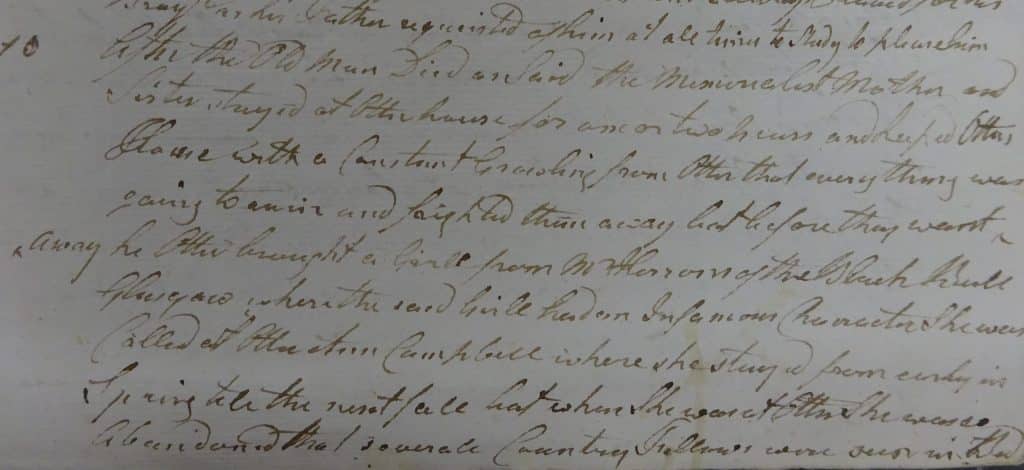
10 After the old man died as said the Memorialist mother and
Sister stayed at the house for one or two years and keeped Otters
House with a Constant Growling from Otter that everything was
going to ruin and frighted them away but before they went
away he Otter brought a girll from Mr Harron of the Black Bull
Glasgow when the said Girll had an Infamous Character she was
Called at Otter Ann Campbell where she stayed from early in
Spring till the next fall but when she was at Otter She was so
Abandoned that several Country Fellows were see in Bed
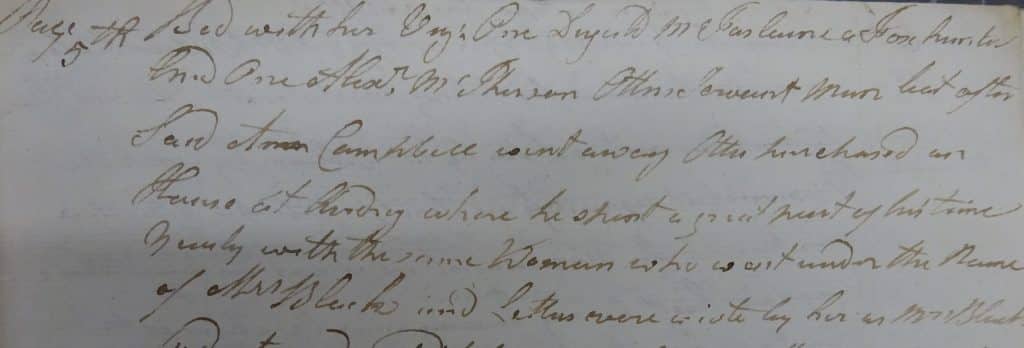
Page 5th Bed with her Viz: One Dugald Macfarlane a Fox Hunter
And One Alexander McPherson Otters Servant Man but after
Said Ann Campbell went away Otter purchased a
House at Olardry where he spent a good part of his time
Yearly with the same woman who went under the name
of Mrs Black
Excerpt 13
Ormidale’s frustration with his brother becomes more evident as the Memorial progresses. While Otter did lead an unconventional lifestyle, he does seem to be trying to do the right thing by the children (who may or may not be his, judging by what Ormidale has written). Ormidale appears to be a more conventional character which presumably exacerbated his feelings towards Otter.
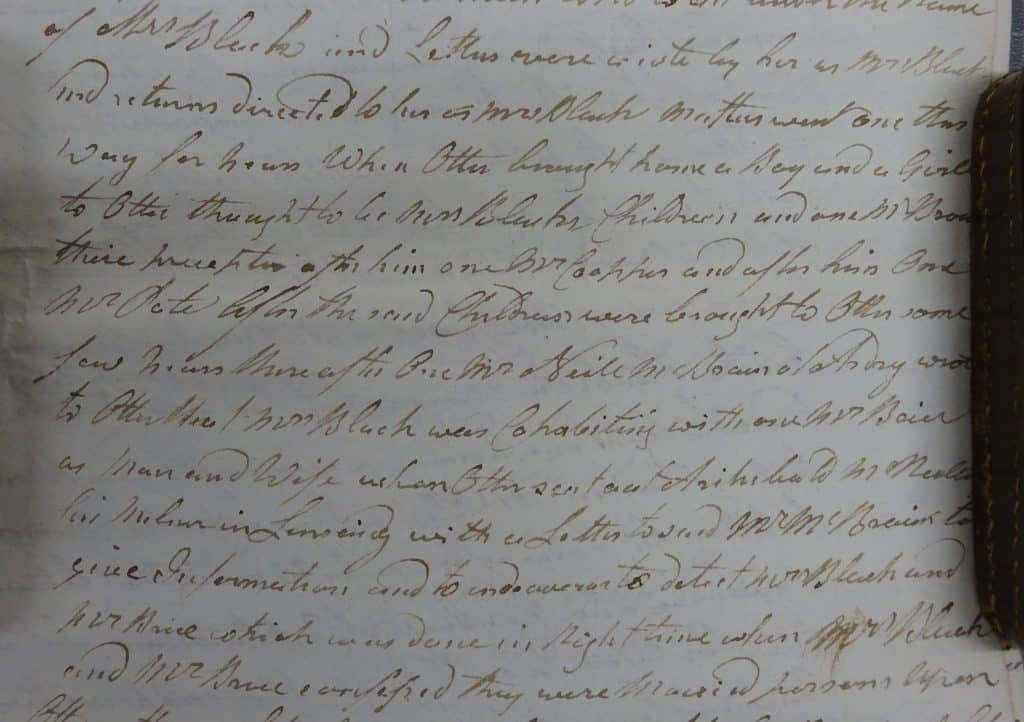
and letters were writ by her as Mrs Black
and returns directed to her as Mrs Black matters went on thus
way for years When Otter brought home a Boy and a Girll
to Otter thought to be Mrs Black’s children and ane Mr Brown
their preceptor after him one Mr Cooper and after him one
Mr Pate before the said Children were brought to Otter some
few years there after one Mr Neill McBain of Ardry wrote
to Otter that Mrs Black was cohabiting with one Mr Bain
as man and wife when Otter sent out Archibald McMeulling
his Milner in Linsaig with letter to said Mr McBain to
give information and to endeaverar to detect Mrs Black and
Mr Bruce which was done in right time when Mrs Black
and Mr Bruce confessed they were married persons
Excerpt 14
There are some unusual words and phrases in this extract:
- The “Bowerr flower” is presumably the floor of a summer house or conservatory.
- A “Tides Waiter” was a Customs Officer working at a port.
- “Jainture” is “Jointure” – an estate settled on a wife for the period during which she survives her husband in cases where there was no dower (i.e. property given by a groom directly to his bride at or before their wedding)
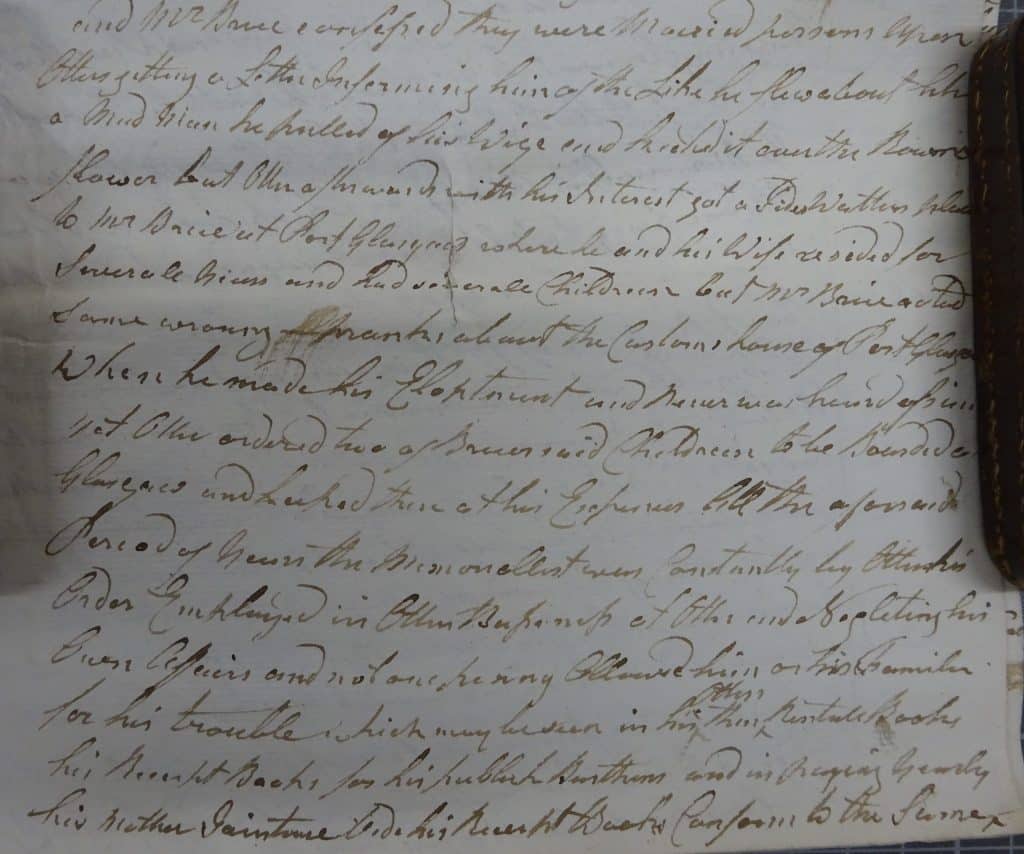
Upon
Otters getting a letter informing him of the like he flew about like
a mad man he pulled of his Wige and kicked it over the Bowerr
flower but Otter afterwards with his Interest got a Tides Waiters place
to Mr Bruce at Port Glasgow where he and his wife resided for
Severall years and had severall chidren but Mr Bruce acted
Some wrong prank about the Customs House of Port Glasgow
When he made his Eloptment and never was heard of since
yet Otter ordered two of Bruces said children to be boarded at
Glasgow and helped there at his expenses Till the aforesaid
period of years the Memorialist was by Otter his
order employed in Otters business at Otter and neglecting his
own Affairs and not one penny allowed him or his familie
for his trouble may be seen in his Otters rentall books
his receipt books for his publick burthens and in paying yearly
his mother Jainture Vide his Receipt Books conform to the same
Page 6th same laying in his repositories at Otter
Excerpt 15
We have another unusual term here. “Setling marches” refers to resolving a dispute over the boundaries between two properties, which could be farms, estates or even a town. In the early minutes of Helensburgh Town Council you can find a description of the council members going around the marches of the burgh to check the boundary stones.
We also have another word that we’re not sure of, in the phrase “Mr William Dey less to the Memorialist”. “Less”, as we use the word today, does not make sense here. It can also mean “junior” or “younger”, or “lease”. However none of those make sense either. Once again we would be pleased if anyone could make any alternative suggestions.
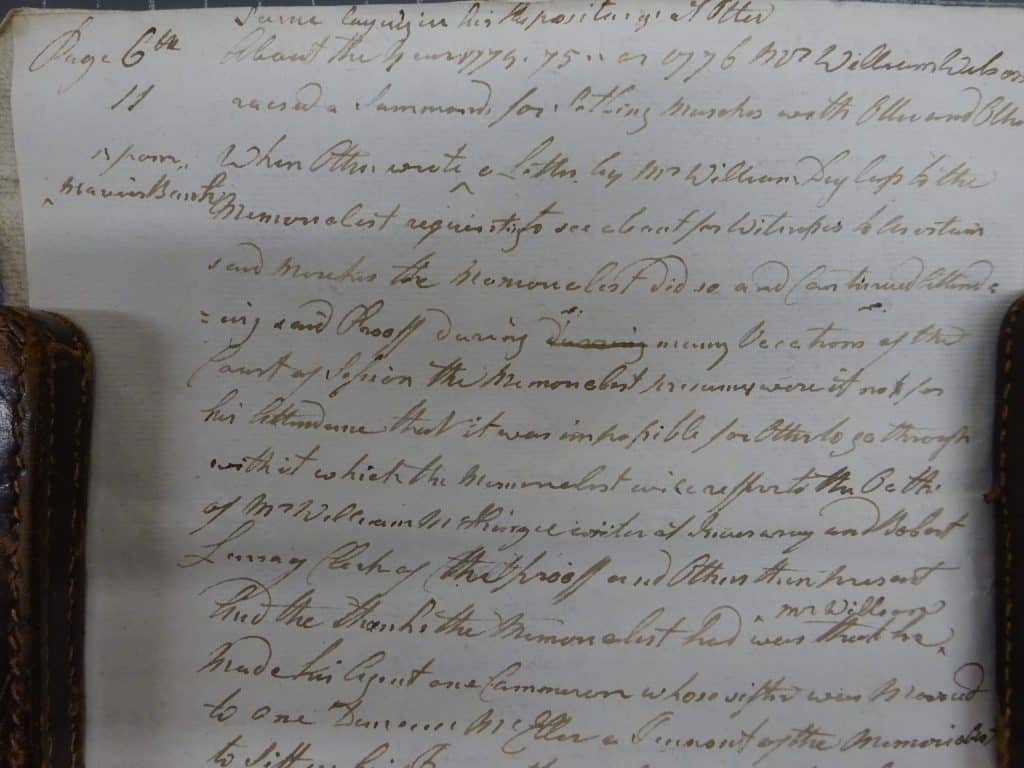
About the year 1774. 1775, or 1776 Mr William Wilson
raised a Summonds for Setling Marches with Otter and others
[?] From When Otter wrote a letter ^ by Mr William Dey less to the
Mavis Bank Memorialist requesting to see about for Witnesses to ascertain
said marches the Memorialist did so and continued Attend=
=ing said Prooff during many Vacations of the
Court of Session the Memorialist presuming were it not for
his Attendance that it was impossible for Otter to go through
with it which the Memorialist will report to the Oath
of Mr William McKenzie writer at Inveraray and Robert
Lenzie Clerk of the proof and Others then present
Excerpt 16
We’re not quite sure what the story is here. It seems that Ormidale’s tenant, Duncan McEllar, refused to vacate his farm when required, and it cost Ormidale a massive amount in legal fees to evict him. He seems to think that McEllar was being encouraged by Otter to do this. Why he thought this we have no idea.
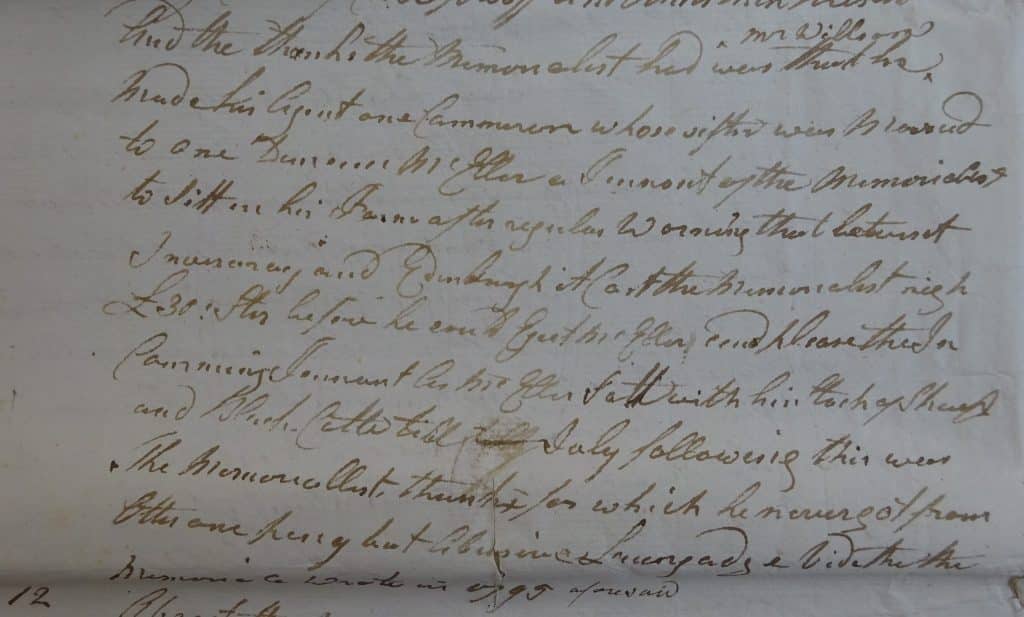
And the thanks the Memorialist had [and Mr Williams was that he
Made his agent ane Cammeron whose sister was Married
to one Duncan McEllar a Tennant of the Memorialist
to Sitt in his Farm after regular warning that betwixt
Inveraray and Edinburgh it cost the Memorialist nigh
£30 Sterling before he could Evict McEllar and please the In
Coming Tennant As McEller sat with his stock of sheep
and Black Cattle till July following this was
The Memorialist thanks for which he never got from
Otter one penny but Abusive Language & Vide the the
Memorial wrote in 1795 as aforesaid
Excerpt 17
Militias, Fencibles & Volunteer Corps were raised for internal defence as a supplement to the Regular Army. For information about military records please see https://www.nrscotland.gov.uk/research/research-guides/research-guides-a-z/military-records
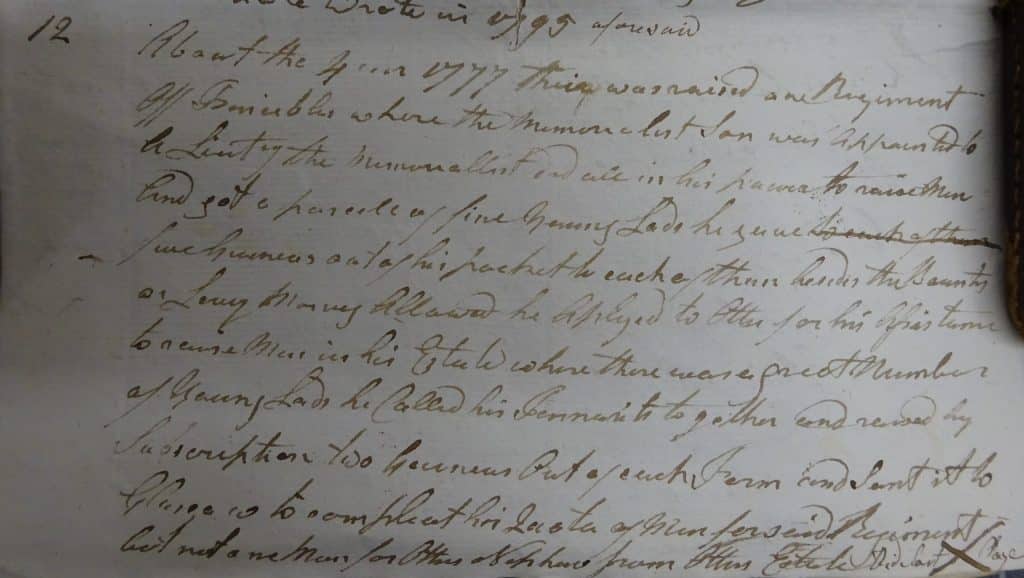
12 About the year 1777 there was raised ane Regiment
Of Fencibles where the Memorialist Son was appointed to
Lieutenant the Memorialist did all in his power to raise men
And got a panel of five young lads he gave
Five guineas out of his pocket to each of them besides the Bounty
Or Levy money allowed he applyed to Otter for his assistance
To raise men in his estate where there was great numbers
Of young lads he called his Tennants to gather and raised by
Subscription two guineas out of each farm and sent it to
Glasgow to compleat his Quota of men for said Regiment
But not ane man for Otters Nephew from Otters Estate Vide Last Page
Excerpt 18
“Succen” is grain. Otter started taking all of the grain grown on the Estate of Otter to the new mill that he built to be ground there. It’s not entirely clear why this was a problem, unless it had previously been taken to a mill on Ormidale estate, which would have led to a drop in income for Ormidale.
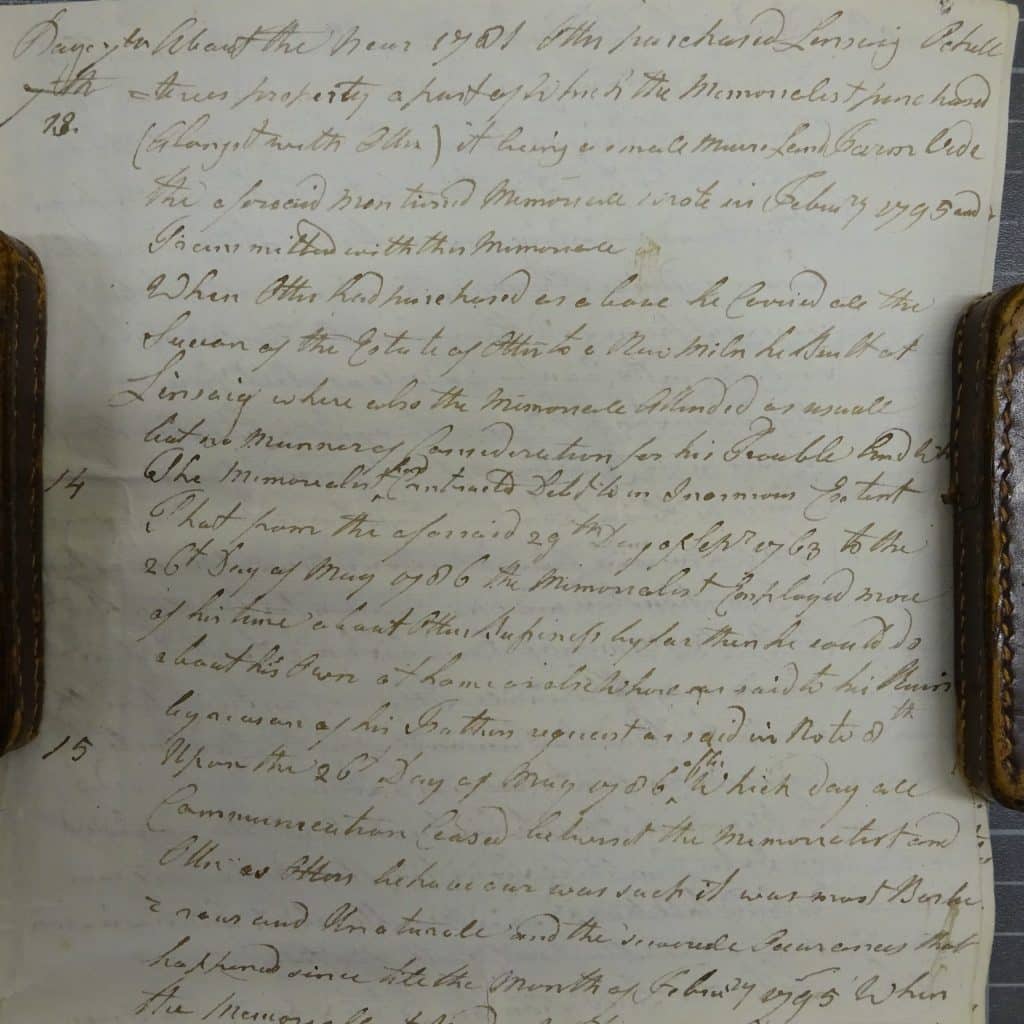
Page 7th About the year 1781 Otter purchased Linsaig Ochill
=trees property a part of which the Memorialist purchased
(Alongst with Otter) it being a small Muir Land Farm Vide
the aforesaid mentioned Memoriall wrote in February 1795 and
Transmitted with this Memoriall
When Otter had purchased as above he Carried all the
Succen of the Estate of Otter to a New Miln he Built at
Linsaig where also the Memoriall attended as usuall
but no manner of consideration for this trouble And When
The Memorialist he contracted Debt in Inorrmous Extent
That from the aforesaid 29th day of September 1763 to the
26th May 1786 the Memorialist employed more
of his time about Otters business by far than he could do
about his own at home or elsewhere as said to his Ruin
by a cause of his Fathers request as said in Note 8th
Upon the 26th day of May 1786 After which day all
Communication ceased betwixt the Memorialist and
Otter as Otters behaviour was such it was most Boister
=ous and Unnaturall and the severall Occurences that
happened since till the month of February 1795
Excerpt 19
It appears that Ormidale solicitor, Duncan Campbell, was not dealing with his claim as quickly as Ormidale would have liked. He fired him, and appointed Mr Archibald Bell instead. We hold a number of Archibald Bell’s own records so maybe there is something in these about this dispute.
Bell’s records actually illustrate quite nicely how finding the records that you need isn’t often straightforward. The first batch was acquired from a solicitor’s office a good few decades ago. The second batch came in as part of an antiquarian’s collection about five years ago. Even when records have survived their location is not always known and they are not always publicly accessible.
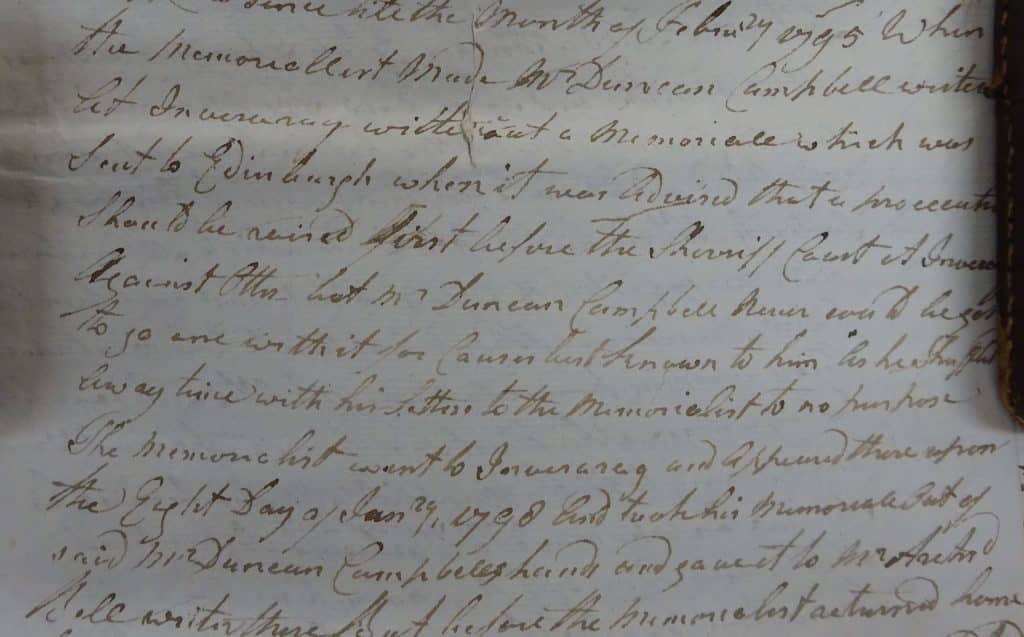
When
the Memoriallist made Mr Duncan Campbell writer at Inveraray
Write out a Memoriall which was
Sent to Edinburgh when it was advised that the prosecution
Should be raised first before the Sheriff Court at Inveraray
Against Otter but Mr Duncan Campbell never would be got
to go ane with it for causes best known to him as he Shuffled
Away twice with his letters to the Memorialist to no purpose
The Memorialist went to Inveraray and appeared there upon
the Eight day of January 1798 And took his Memorial Out of
said Mr Duncan Campbells hands and gave it to Mr Archibald
Bell writer there
Excerpt 20
We did wonder whether Ormidale’s illness when he was at Strachur might have been self-inflicted. He believed that he had finally inherited Otter, as promised by his father decades before.
“Jamie” is another word that we’re not completely sure about. We can’t find a reference to him anywhere else.

But before the Memorialist returned home
he was informed by Doctor Jamie Campbell that Otter was dead
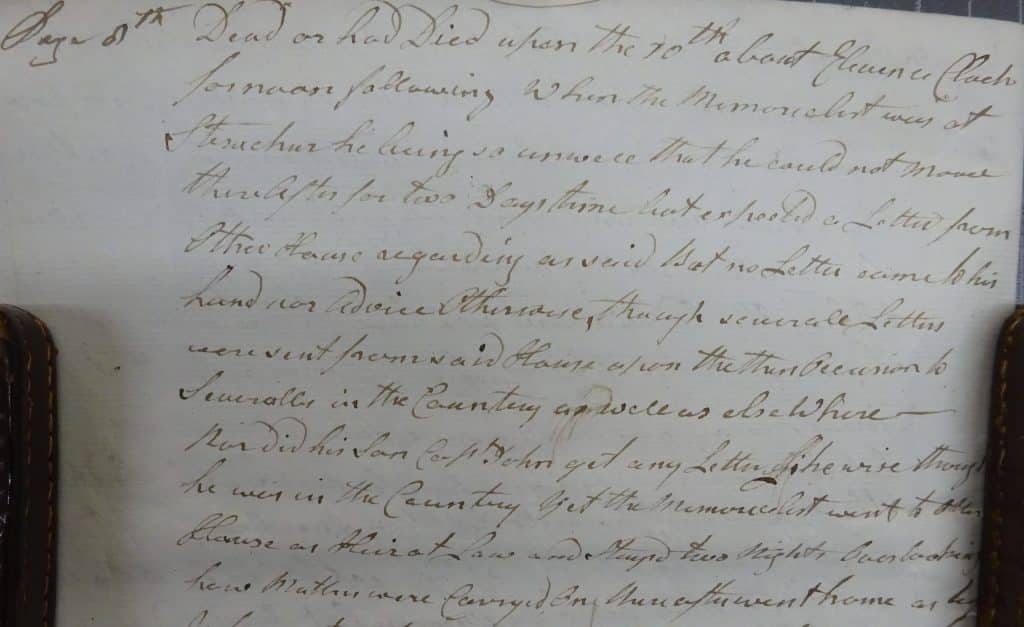
Page 8th or had died upon the 10th about Eleven a Clock
Forenoon following When the Memorialist was at
Strachur he being so unwell that he could not move
Thereafter for two days time but expected a Letter from
Otter House regarding as said but no Letter came to his
hand nor Advice otherwise, though severall letters
were sent from said house upon the then Occasion to
Severalls in the Country as well as elsewhere
Nor did his son Captain John get any letter likewise though
He was in the Country Yet the Memorialist went to Otter
House as Heir at Law and stayed two nights overlooking
How matters were carried On
Excerpt 21
John Campbell was one of the children of Mrs Black and, unbeknown to Orimidale, the heir to Otter Estate.
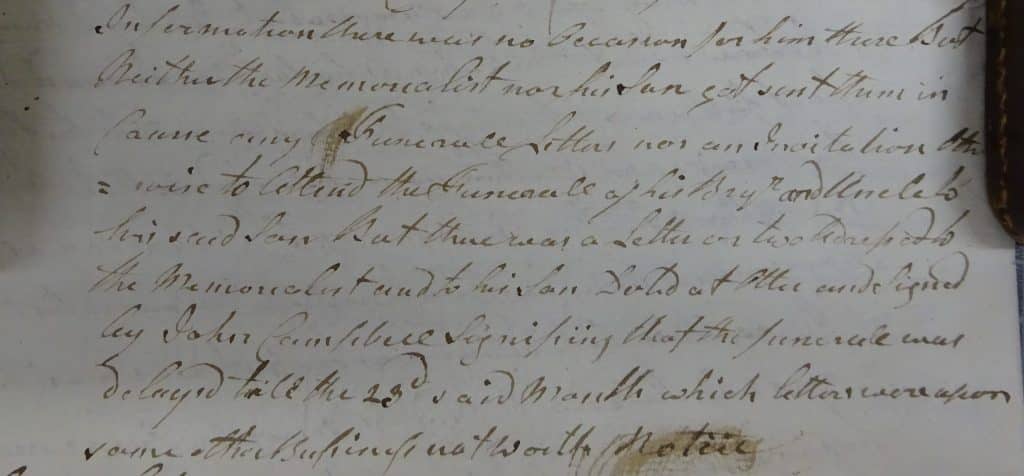
Thereafter went home as by
Information there were no Decisions for him there But
Neither the Memorialist nor his son got sent them in
Causse any Funerall Letters nor an Invitation Other=
=wise to Attend the Funeral of his Brother and Uncle to
His said son But there was a Letter or two addressed to
The Memorialist and to his son dated at Otter and signed
By John Campbell that the funeral was
Delayed till the 23rd said month which letter was upon
Some other Business not worth notice
Excerpt 22
Here we have Ormidale getting down to the legal basis of his complaint – that Otter had changed their father’s legal papers to make it look as if he could do whatever he wished with the estate, and hid any records that would show that he did not have the power to do so.
We also have another phrase that we can’t quite work out – “and Furlage lent” appears to be what is written above “Boisterous Dispositin”, but that means nothing to us.
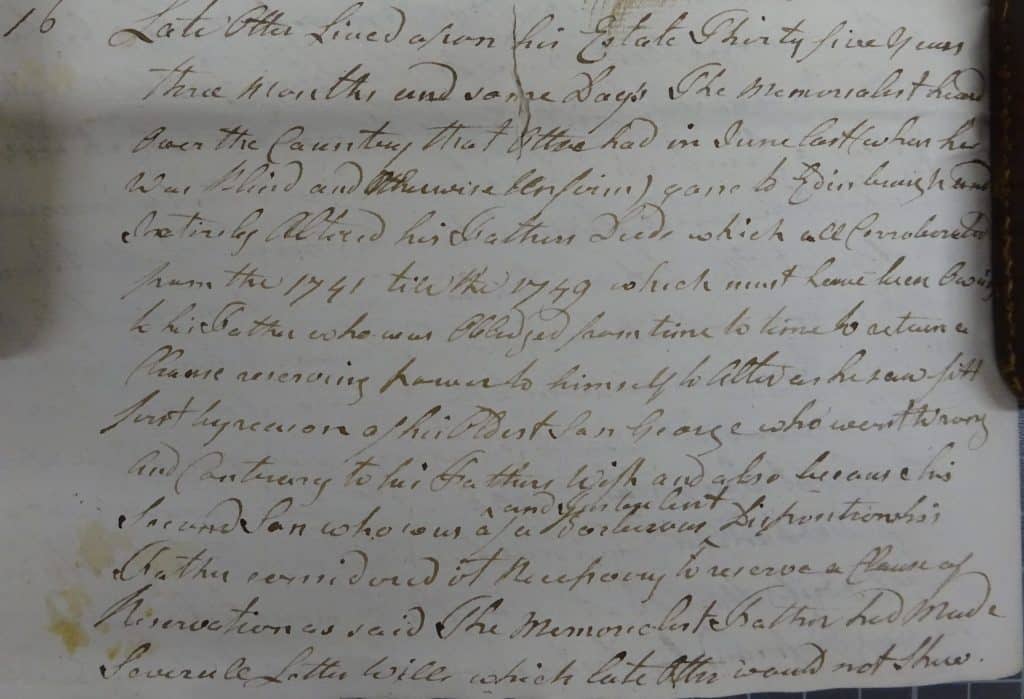
16 Late Otter lived upon his Estate Thirty five years
Three months and some days The Memorialist heard
Over the Country that Otter had in June last when he
Was Blind and otherwise Unfaring gone to Edinburgh and
Intirely Altered his Fathers Deeds which all Corroborated
From the 1741 till the 1749 which must have been Owing
To hide who was Obliged from time to time to actain a
Clause reserving power to himself to Alter as he saw fit
First by reason of his Oldest son George who went wrong
And Contrary to his Fathers Wish and also because his
^ and Furlage lent
Second son who was of a Boisterous Dispositin
Father considered it Necessary to reserve a Clause of
Reservation as said the Memorialist Father had made

Page 9th Sure in a friendly manner to the Memorialist nor would
Nor his wifes he in like manner Shew his Mothers Contract of Marriage
Contract of Marr= nor any other papers Whatever which Shews a perverse
=iage which lay Diabolocall Temper of Mind with Scarce a parralell
At Otter
Excerpt 23
Orimdale’s argument here is that his brother exerted undue influence over their father because it amused him to pull the rug from under his feet, as it were.
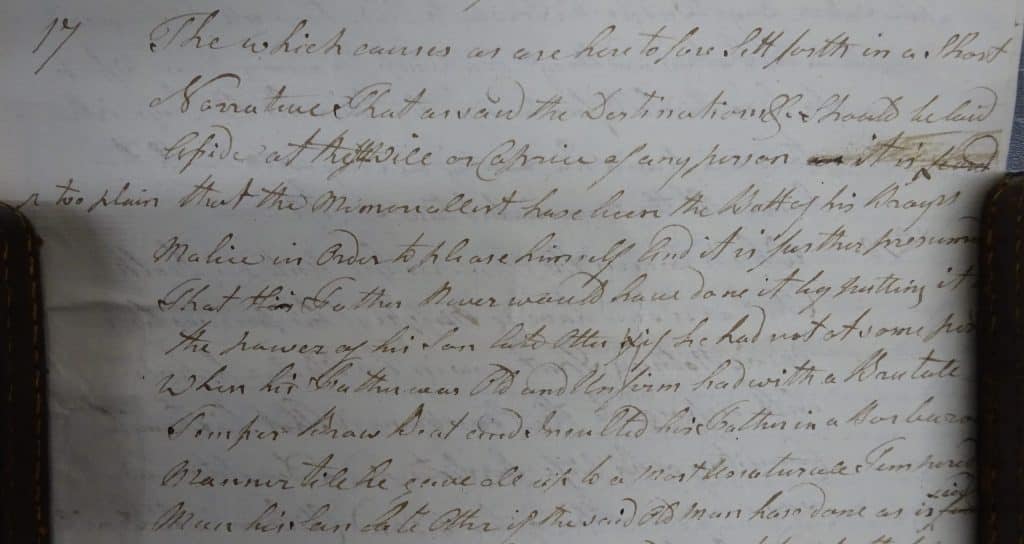
17 The which causes are heretofore Sett forth in a Short
Narrative that ansars the Destinations & should be laid
Aside at the Will or Caprice of any person it is feard
Too plain that the Memorialist has been the Butt of his Brothers
Malice in order to please himself And it is further presumed
That His Father never would have done it by putting it in
the power of his son Late Otter if he had not at some point
When his father was old and unfirm had with a Brutall
Temper Brow Beat and Insulted his Father in a Barbarous
Manner till he gave all up to a Most Unnatural Tempered
Man his son late Otter
Excerpt 24
Ormidale evidently regarded his brother as something of a “spoiled brat” who had had his temper tantrums indulged in childhood and who took the same approach as an adult.
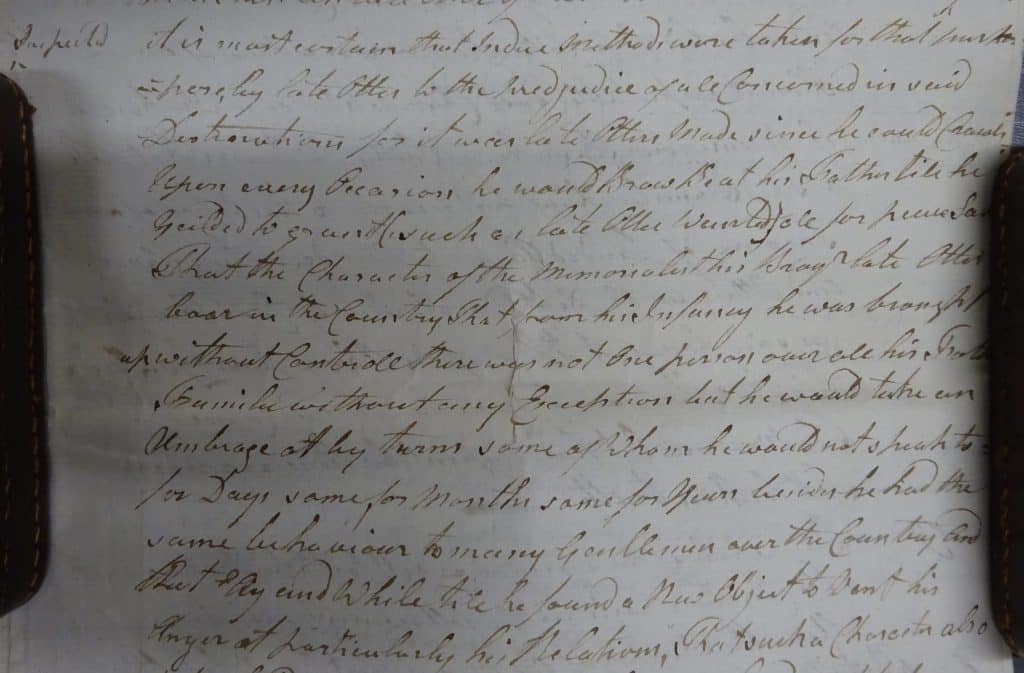
if the said old man had done as is said
Suspected it is most certain that Indue Methods were taken for that purpo
=pers by late Otter to the prejudice of all concerned in said
Destinations for it was late Otter made since he could Crawl
Upon every occasions he would brow Beat his Father till he
Yielded to grant such as late Otter wanted sole for peace Sak
That the character the Memorialist his brother late Otter
boar in the Country That from his Infancy he was brought
up without Controll there was not one person over all his Fathers
Familie without any Exceptions but he would take an
Umbrage at by turns same as Whom he would not speak to=
for Days same for Months same for Years besides he had the
same behaviour to many Gentlemen over the Country and
that By and while till he found a New Object to Vent his
Anger at particularly his relations,
Excerpt 25
This extract really does make you appreciate modern punctuation. The entire memorial contains no more than a handful of commas or full stops, as is typical with eighteenth century writing, and uses capitalisation to emphasize important words.
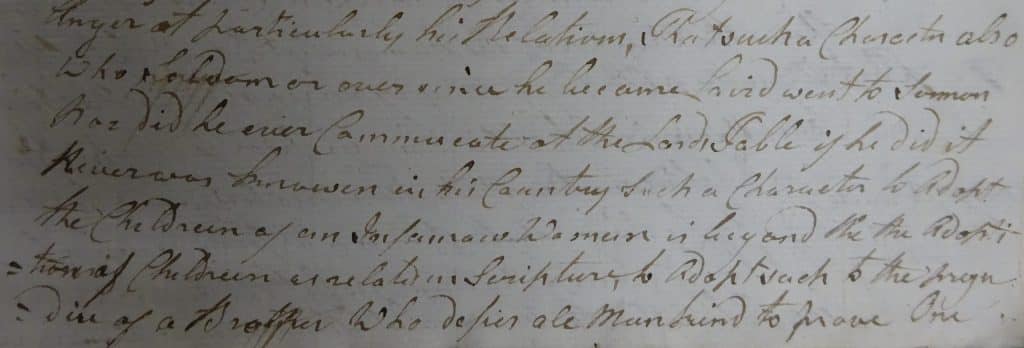
That such a character also
Who seldom or ever since he became Laird went to sermon
Nor did he ever communicate at the Lords Table if he did it
Never was Knowen in his Country Such a Character to Adopt
the Children of an Infamous Woman is beyond the the Adopti
=tion of Children as related in Scripture to Adopt such to the preju
=dice of a Brother who defies all Mankind to prove One
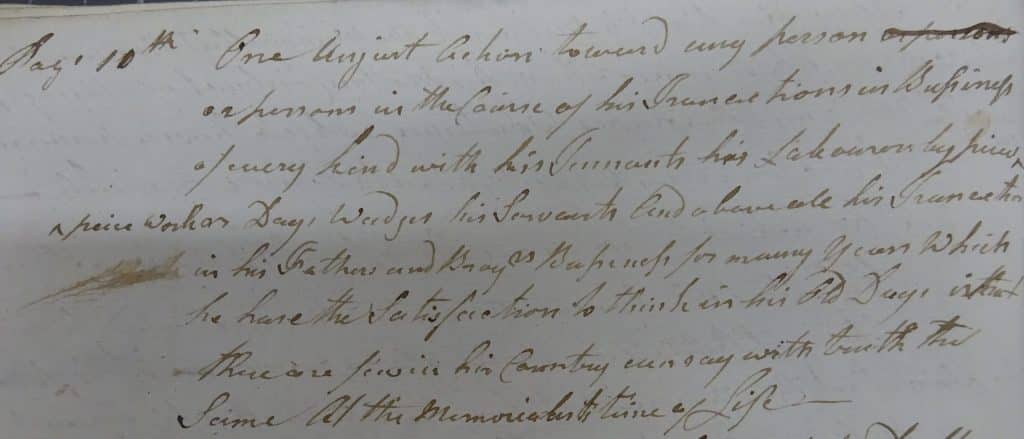
Page 10th One unjust Action toward every person
or persons in the Course of his Transactions in Business
of every kind with his Tennants his labourers by piece
Workers Days Wadges his Servants and above all his Transections
in his Fathers and Brothers business for many years which
he hase the Satisfaction to think in his old days is that
there are few in his Country can say with truth the
Same at the Memorialist time of life ———
Excerpt 26
Ormidale repeatedly says that he neglected his own estate, concentrating instead on ensuring that Otter was run properly. “Paitty Children” presumably means “small children”, from the French “petit”.
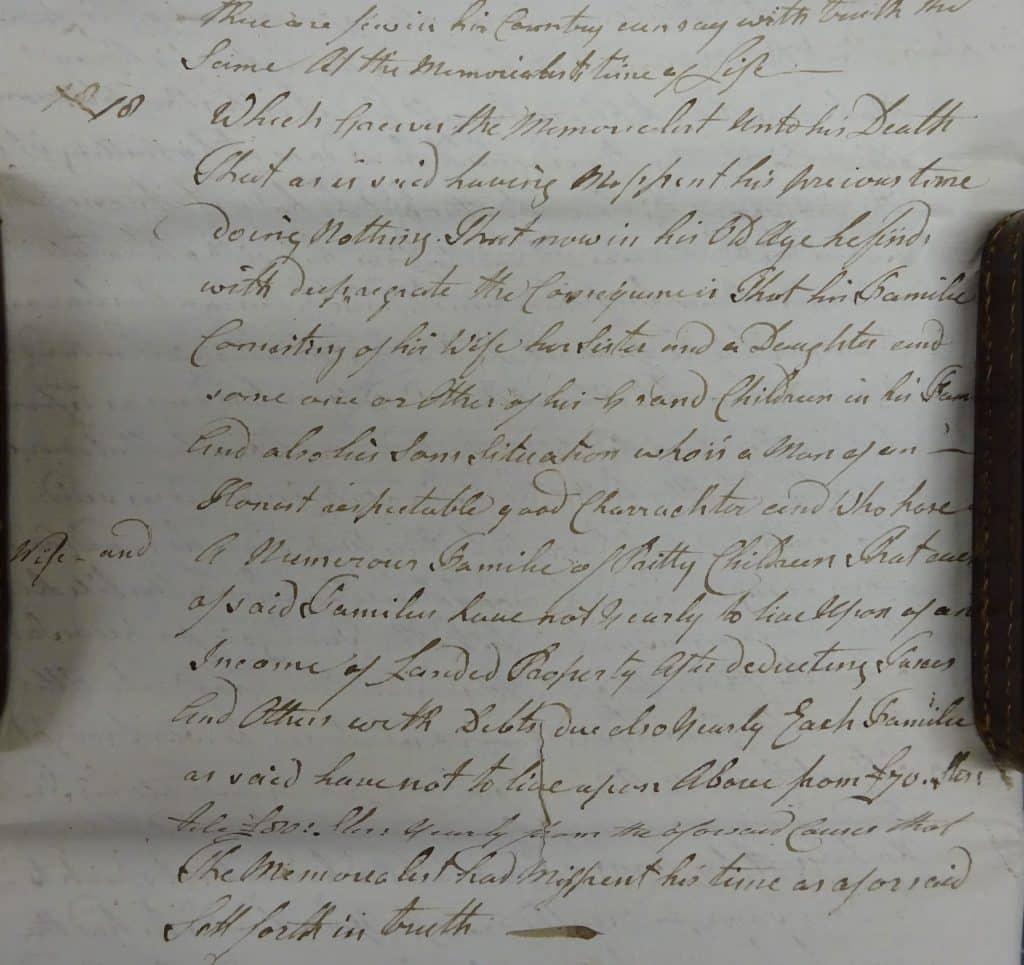
18 Which Gauves the Memorialist unto his Death
That as is said having Misspent his precious time
doing nothing. That now in his Old Age he finds
with deep regret the Consequence is that his Familie
Consisting of a Wife her sister and a daughter and
some ane or Others of his Grand Children in his familie
And also his Sons Situation who is a Man of an
Honest respectable good character and Who hase a
Wife and A numerous family of Paitty Children and that such
of said familie have not yearly to live upon of an
Income of Landed Property After deducting Taxes
And Others with debts due also Yearly each Familie
As said have not to live upon Above from £70 Sterling
till £80 Sterling Yearly from the aforesaid causes that
The Memorialist had misspent his time as aforesaid
Sett forth in truth ———–
Excerpt 27
Here we have the reason that the two brothers finally became completely estranged. Otter claimed that he had given Ormidale money to pay a bill, and that Ormidale had kept it. Later in the memorial Ormidale says that he did use the money for its intended purpose.
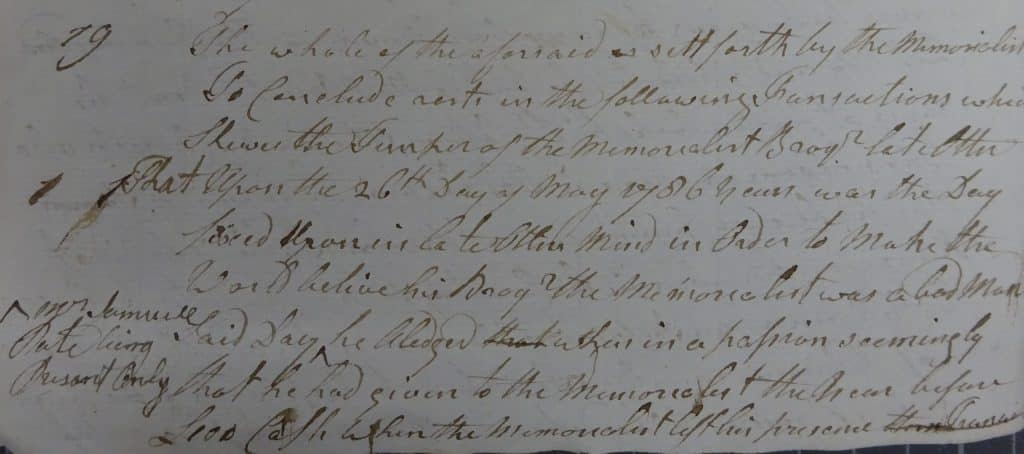
19 The whole of the aforesaid as sett forth by the Memorialist
To conclude rests in the following Transactions which
Shewes the Temper of the Memorialist Brother late Otter
That Upon the 26th Day of May 1786 Years was the Day
fixed Upon in Late Otters mind in order to make the
World believe his Brother the Memorialist was a bad Man
Mr Samuell Said day he alledged that when in a passion seemingly
Pate being that he had given to the Memorialist the year before
Present only £100 Cash when the Memorialist left his presence

Page 11th presence after refusing the same this is also as asserted in
the aforesaid Memorial wrote in February 1795 years
2nd Upon which Otter in June following the said 26th May 1786
He went to Edinburgh when there Cussed and Damned
himself that the Memorialist a Damned Cheat
Excerpt 28
Here Otter is sending mutual friends to Ormidale as peacemakers, but with a list of demands that Ormidale finds unacceptable. It would be interesting to see what these were but, as far as we can tell, the list has not survived.
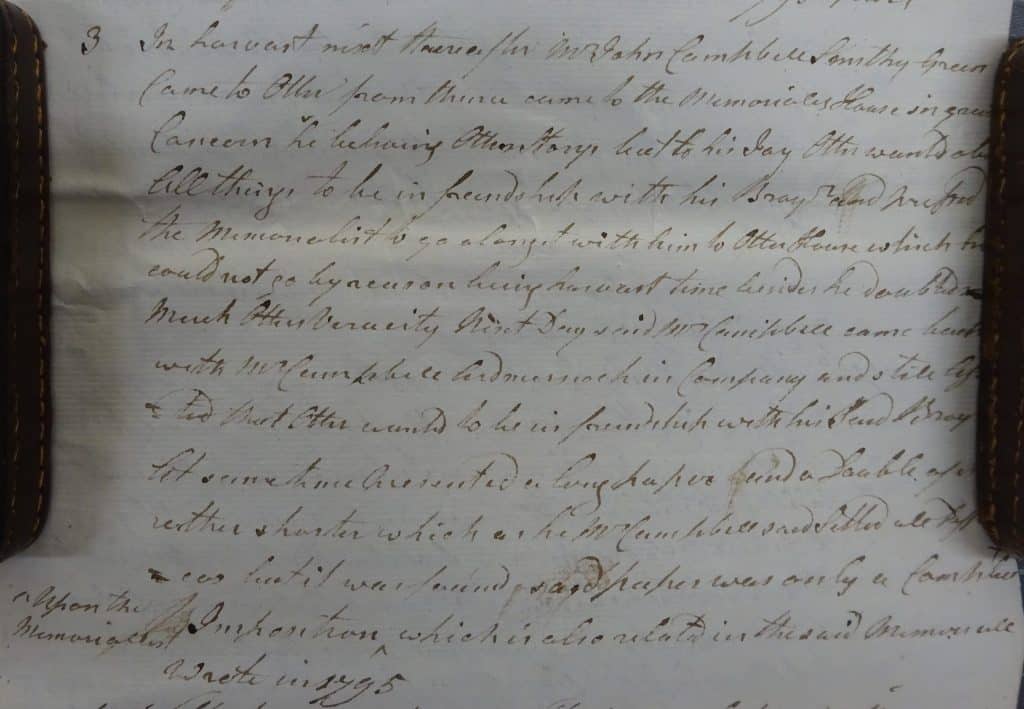
this also is
Also referred to in the Memorial as said 1795 years
3 In harvest nixt thereafter Mr John Campbell Smithy Green
Came to Otter from thence came to the Memorialist house in great
Concern he believing Otters Storys but to his Joy Otter wanted above
All things to be in friendship with his brother and pressed
the Memorialist to go along with him to Otter House which he
could not go by reason being harvest time besides he doubted
Much Otters veracity Next Day said Mr Campbell came back
with Mr Campbell Ardmarnock in company and still Assert
=ted that Otter wanted to be in friendship with his Said Brother
at sametime presented a long paper and a Double of it
rather shorter which as he Mr Campbell said settled all Differe
=ces but it was found said paper was only a Compleat
Upon the Imposition which is also related in the said Memoriall
Memorialist Wrote in 1795
Excerpt 29
The brothers remained estranged for a number of years, until Otter again asked a friend to act as mediator.
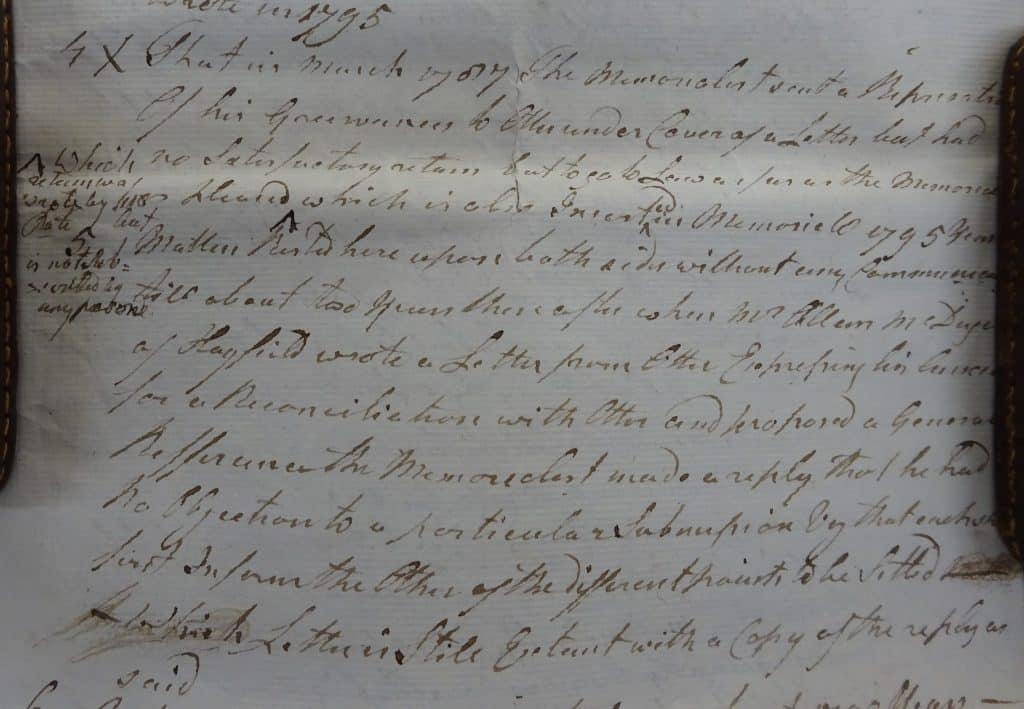
That in much of 1787 the Memorialist sent a Reprisation
Which Of his Grievances to Otter under cover of a letter but had
Return was no satisfactory return but to go to law as far as the Memorial
Wrote by [?] was pleased which is also Inserted in Memoriall 1795 Years
Date But Matters rested here upon both sides without any Communication
5 till about two years thereafter when Mr Allen McDugall
Is not sub of Hayfield wrote a letter from Otter Expressing his Anxiety
=scribed by for a reconciliation with Otter and proposed a Generall
Any person Reference the Memoriallist made a reply that he had
No objection to a particular Submission Viz that each should
first inform the Other of the different points to be Settled
Which letter is still Extant with a copy of the reply as
said
Excerpt 30
Again, we have the sort of family history information that you wouldn’t ordinarily expect to find in the standard sources. Ormidale was involved in an accident that left him seriously injured. In many cases, this could explain later financial difficulties, or even strange behaviour that might have been caused by ongoing pain.
We weren’t sure at first about the word “nodes”, down towards the end of the extract, then realised that Ormidale must have meant “notes”.

6 Matters still rested till the 15th day of August 1790 Years —
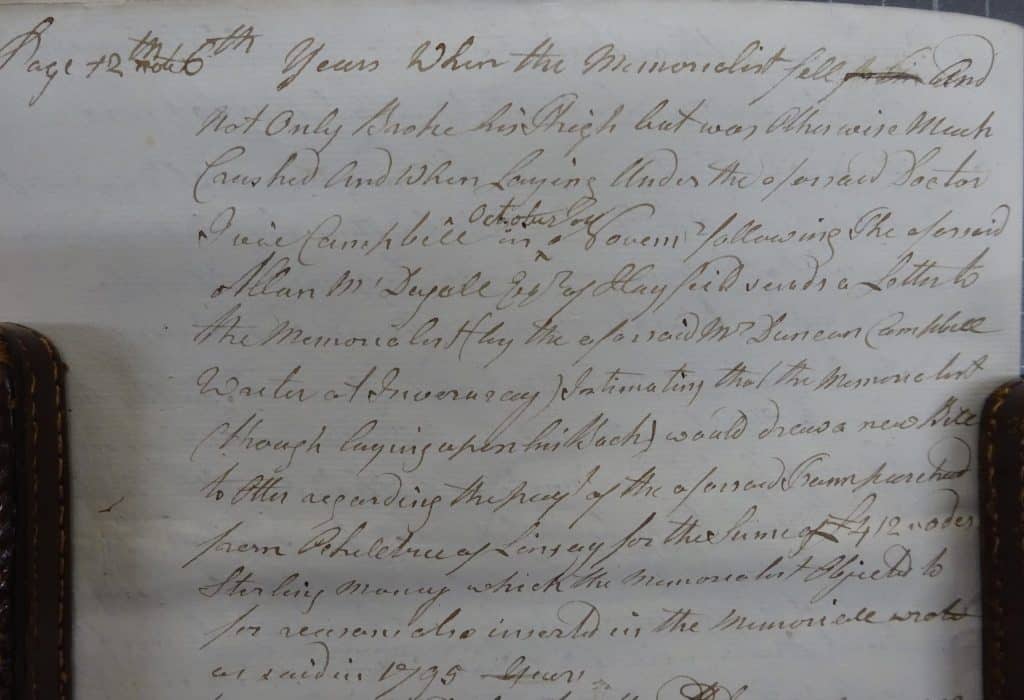
Page 12th Note 6th Years when the Memoriallist fell And
Not only broke his Thigh but was Otherwise much
Crushed and when laying Under the aforesaid Doctor
Jamie Campbell in October or November following The aforesaid
Allan McDougall Esq of Hayfield sends a Letter to
the Memorialist (by the aforesaid Mr Duncan Campbell
Writer at Inveraray) Intimating that the Memorialist
(though laying upon his back) would draw a new Bill
to Otter regarding the payment of the aforesaid Farm purchased
from Ochiltree of Linsaig for the sum of £412 nodes
Sterling money which the Memorialist objected to
for reasons also inserted in the Memoriall wrot
as said in 1795 Years
Excerpt 31
Otter is again using a friend as a go-between and on this occasion his ploy seems to have had some success, at least until Hayfield made a throwaway remark as he left.
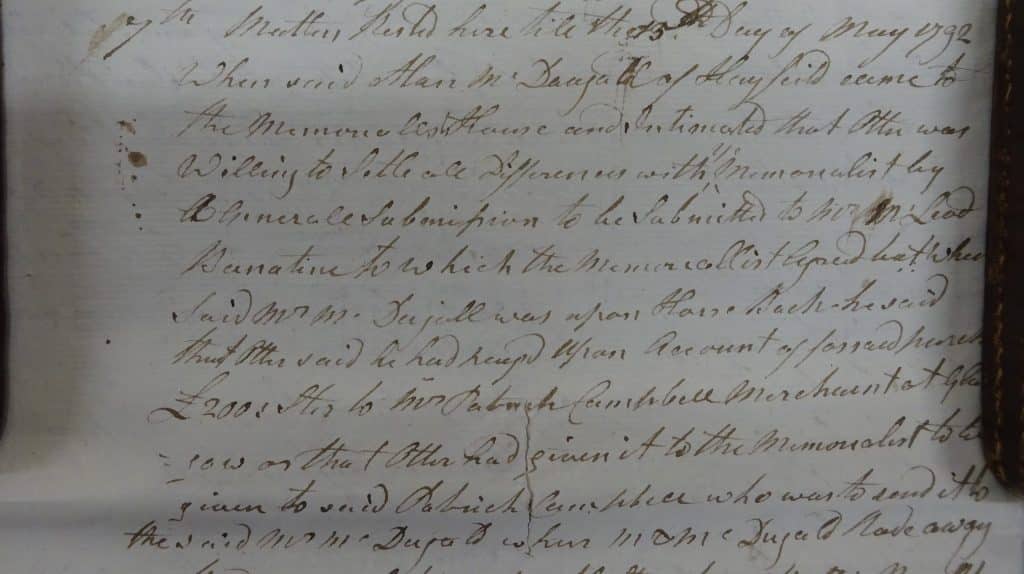
7th Matters rested here till the 3rd day of May 1792
When said Allan McDougall of Hayfield came to
the Memorialist house and Intimated that Otter was
Willing to settle a difference with the Memorialist by
A Generall Submission to be submitted to Mr McLeod
Banatine to which the Memoriallist Agreed but When
said Mr McDougall was upon Horseback he said
that Otter said he had payd upon the account of forsaid purchases
£200 Sterling to Mr Patrick Campbell merchant at Glas
=gow or that Otter had given it to the Memorialist to be
given to said Patrick Campbell who was to send it to
the said Mr McDougall whur in McDougall made away
Excerpt 32
This explains why Orimdale was unhappy with Hayfield’s departing remarks from yesterday’s extract. He responded by trying to proceed with his court action against Otter.
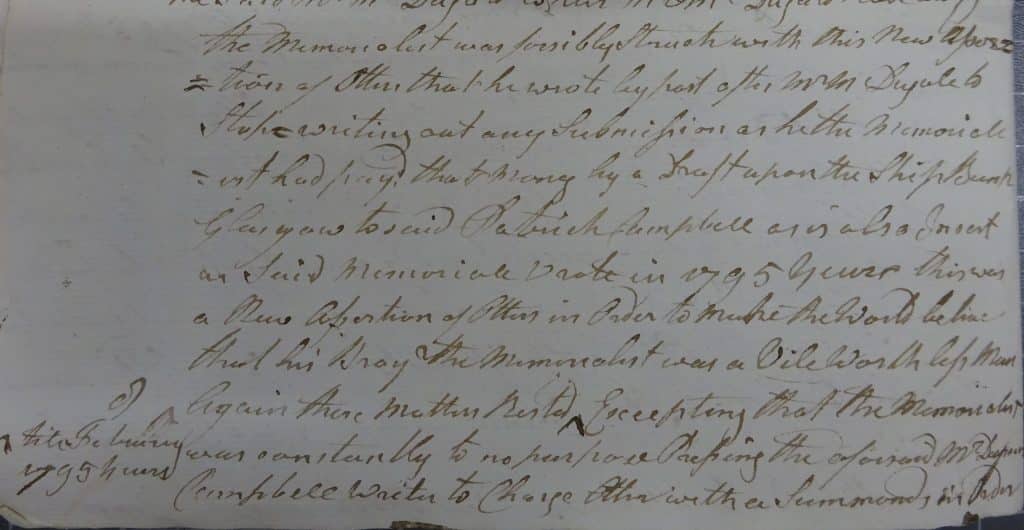
the Memorialist was forcibly struck with this new Asser=
=tion of Otters that he wrote by past after Mr McDougall to
Stop writing out every Submission as he the Memoriall
=ist had payd that money by a draft upon the Ship Bank
Glasgow to said Patrick Campbell as is also Insert
as said Memoriall wrote in 1795 years this was
a New Assertion of Otters in Order to make the World believe
that his Brother the Memorialist was a Vile Worthless Man
Again these matters rested Excepting that the Memorialist
Till February as constantly at no purpose Pressing the aforesaid Mr Dougall
1975 years Campbell Writer to Charge Otter with a Summonds in Order

Page 13th Note 8 Order to disprove the aforesaid Assertion and that
After February 1795 till as said two days when at Inveraray
before Otters death the Memorialist took said Memoriall
Out of said Mr Duncan Campbells hands and gave it
and a copy of the Representation mentioned in Note 4th
To Mr Archibald Bell Writer Inveraray
Excerpt 33
Otter’s response to Ormidale’s threatened legal action was to cut him out of his will.
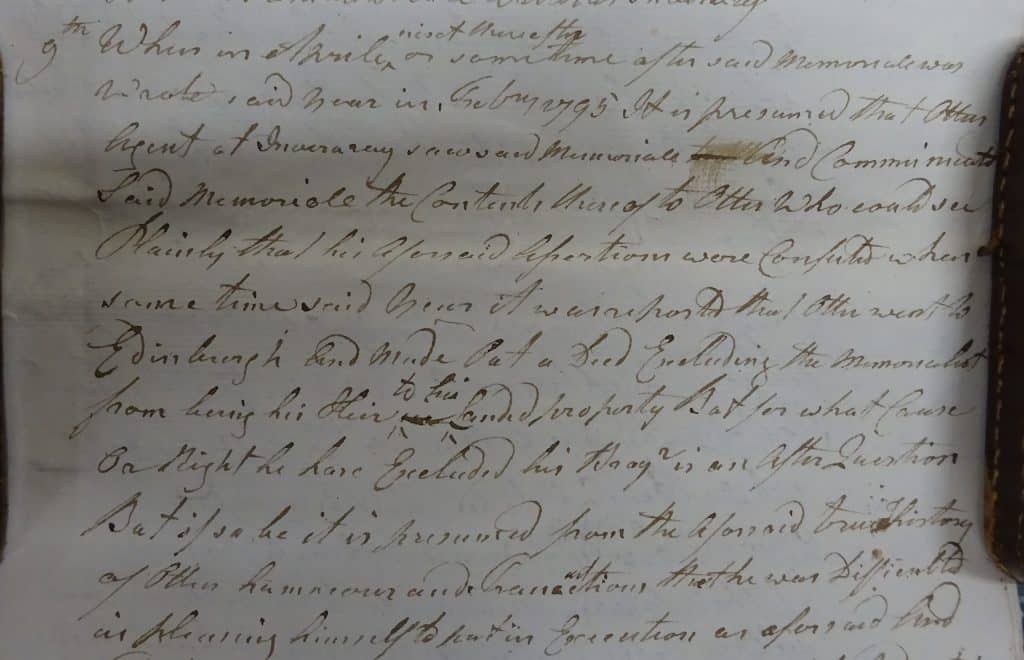
9th When in Aprile or sometime after said Memoriall was
Wrote said Year in February 1795 It is presumed that Otters
Agent at Inveraray saw said Memoriall And Communicated
Said Memoriall the Contents thereof to Otter who could see
Plainly that his aforesaid Assertions were Confuted when
same time said year It was reported that Otter went to
Edinburgh and made out a deed Excluding the Memorialist
from being his Heir to his Landed Property But for what Cause
Or right he has excluded his Brother is an other Question
But also it is presented from the aforesaid true history
of Otters humour and transactions that he was Dissembled
as pleasing himself to certain Executions as aforesaid
Excerpt 34
Ormidale seems to be saying here that Otter tried to keep him short of cash so that he wouldn’t be able to contest his will after his death, and that it would be both illegal and unchristian to let him get away with this.
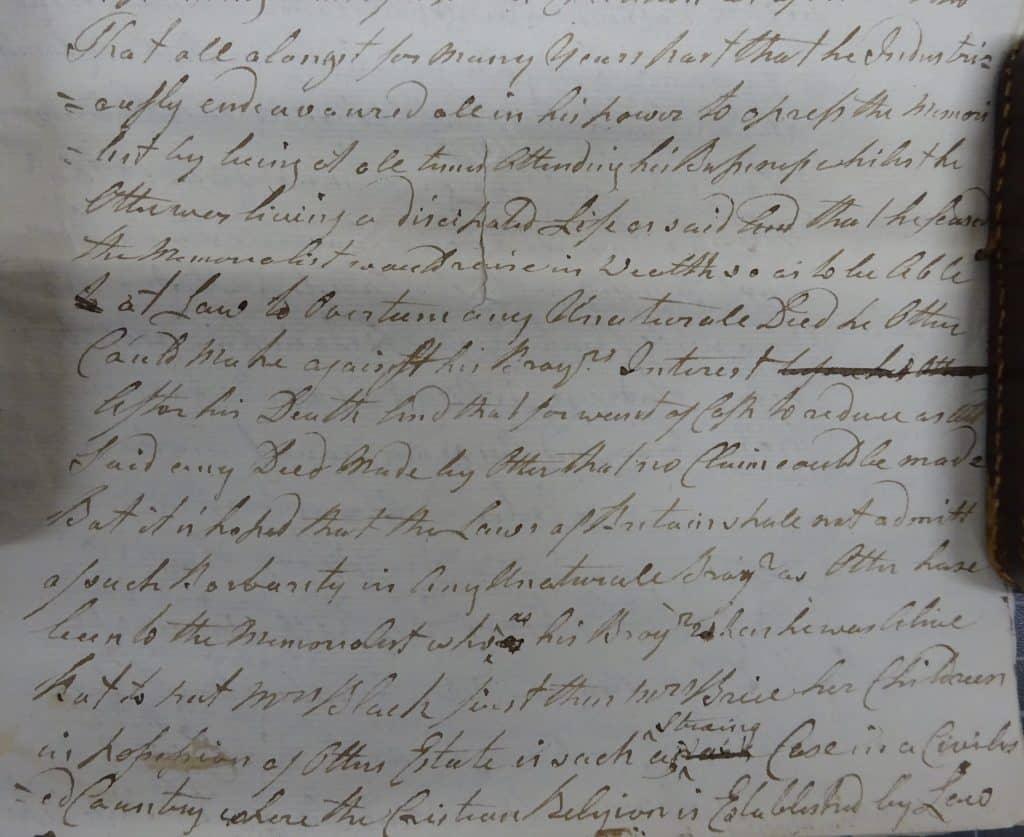
And
That all alongst for many years past that he Industri=
=ausly endeavoured all in his power to oppress the Memori
=list by being at all times attending his Business whilst the
Otter was living a discipated Life as said And that he sensed
the Memorialist would raise in Wealth so as to be Able
at Law to Overturn any Unaturall Deed he Otter
Could make against his Brothers Interest
After his Death And that for want of Cash to reduce as
Said any Deed made by Otter that two Claims could be made
But it is hoped that the Laws of Britain shall not admit
of such a Barbarity in Any Unaturall Brother as Otter hase
been to the Memorialist who as his Brother when he was Alive
But to put Mrs Black first thin Mr Bruce her Children
in possession of Otters Estate is such a Straing Case in a Civilis
=ed Country where the Cristian Religion is Established by Law
Excerpt 35
Ormidale gave the memorial to his son John to take to his solicitor in Edinburgh. By this time he was about 76 years old and perhaps still suffering from the effects of his accident eight years previously, and so may not have been able to make the journey himself.
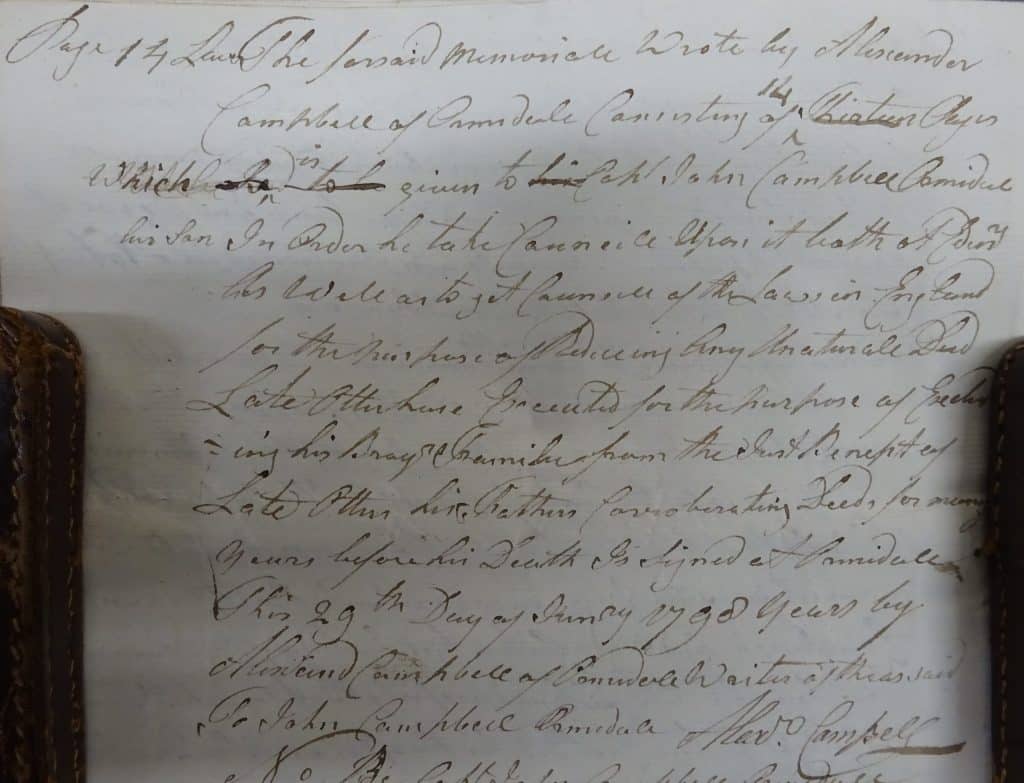
Page 14 Lair The forsaid Memoriall wrote by Alexander
Campbell of Ormidale Consisting of 14 pages
Which is given to Captain John Campbell Ormidale
his son In Order he take Councill Upon it both at Edinburgh
As well as to get Councill of the Laws in England
for the purpose of Educing any Unaturall Deed
Late Otter hase Executed for the Purpose of Exclud
=ing his Brothers Familie from the Just Benefit of
Late Otters his Fathers Corroborating Deeds for many
Years before his Death Is Signed at Ormidale
The 29th Day of January 1798 Years by
Alexander Campbell of Ormidale Writer of the as said
To John Campbell Ormidale
Alexander Campbell
Excerpt 36
Here Ormidale is giving John detailed instructions on how to proceed with his court case.
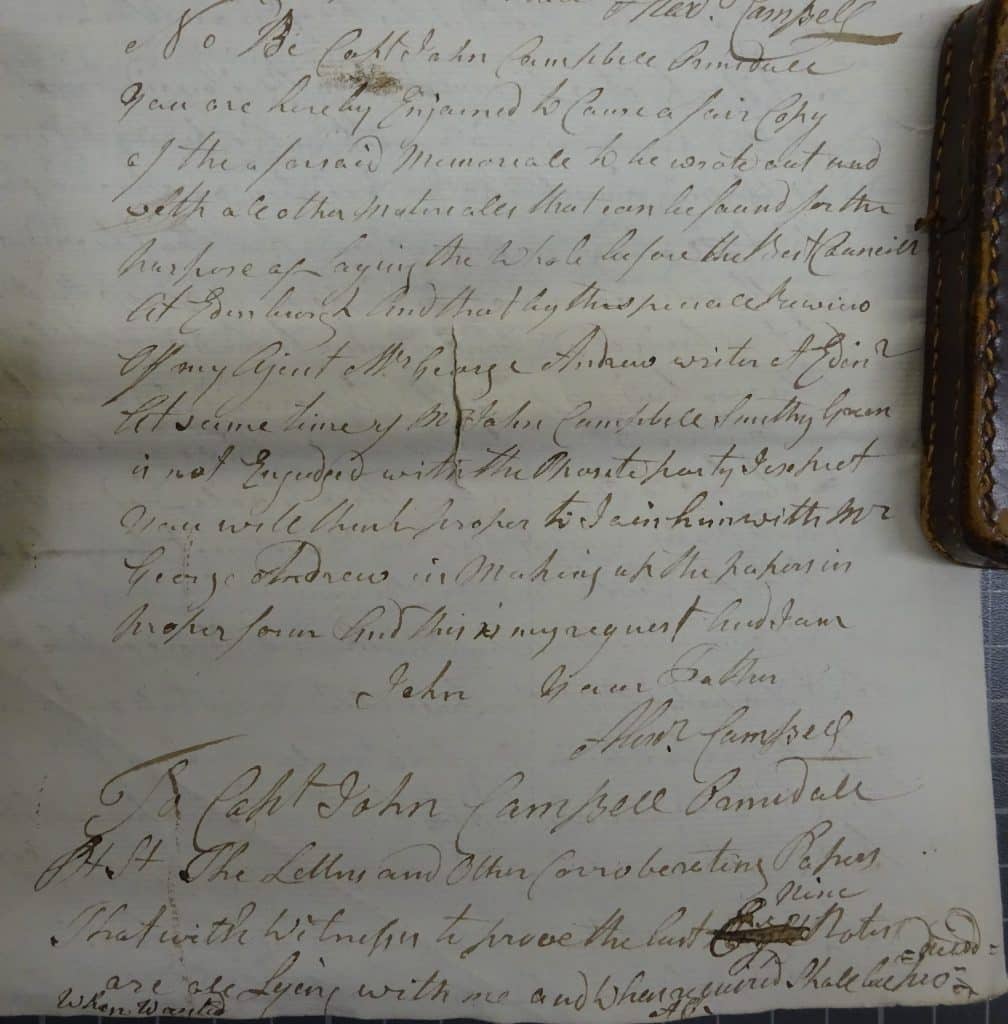
No[ta] Be[ne] John Campbell Ormidale
You are hereby enjoined to cause a fair Copy
of the aforesaid Memoriall to be wrote out and
with all other Materialls that can be found for the
Purpose of laying the whole before the Best Councill
At Edinburgh And that by the speciall Rewiew?
Of my agent Mr George Andrew writer at Edinburgh
At same time if Mr John Campbell Smithy Green
is not Engadged with the Oposite party I expect
You will think proper to join him with Mr
George Andrew in making up the papers in
proper form And this is my request And I am
John Your Father
Alexander Campbell
To Captain John Campbell Ormidale
Atst The Letters and Other Corroborating Papers
That with the Witnesses to prove the last nine Notes
are Lying with me and When accuired shall be provided
When wanted
Excerpt 37
Having completed his memorial, Ormidale is reiterating his claim that his father had taken steps to ensure that Otter could not prevent him from inheriting the estate.
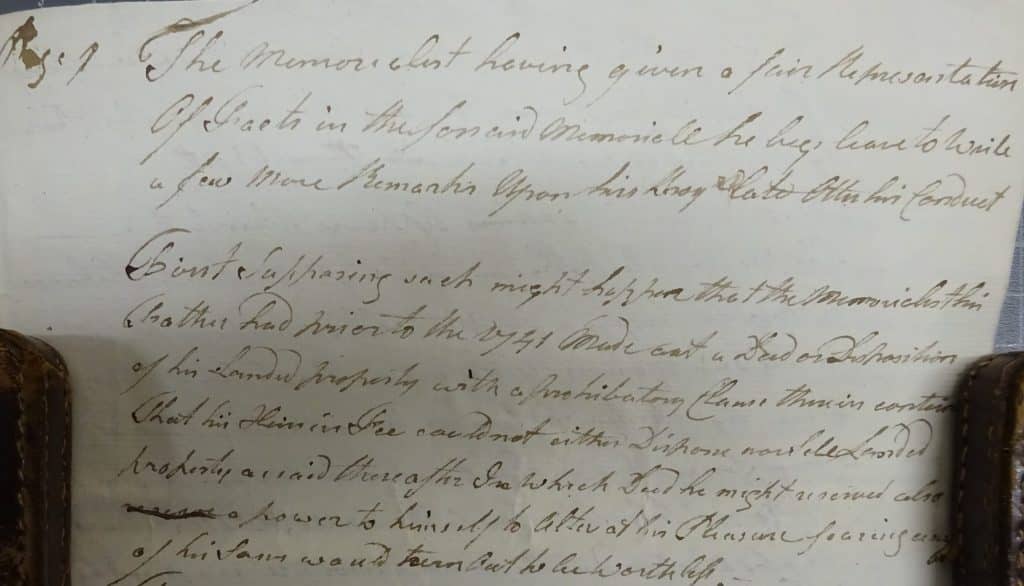
Page 1 The Memorialist having given a fair Representation
Of facts in the forsaid Memoriall he begs leave to write
a few more Remarks upon his Brother late Otter his Conduct
First supposing such might happen that the Memoriallist his
Father had prior to 1741 made out a Deed or Disposition
of his Landed property with a prohibatory clause therin contained
That his Heir in Fee could not either dispone nor Sell Landed
property as said thereafter In which Deed he might reserved also
a power to himself to Alter at his Pleasure fearing any
of his sons would turn out to be worthless
Excerpt 38
And again, Ormidale is saying that Otter took advantage of their father’s age and state of health, and bullied him into changing his will.
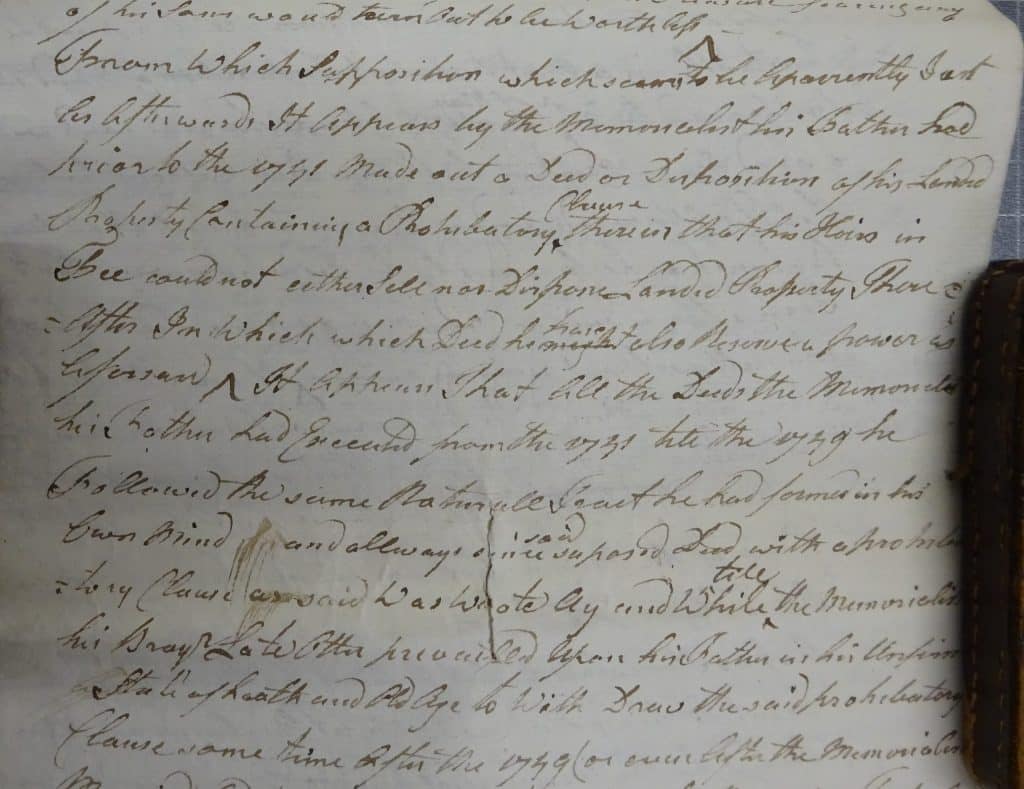
From which Supposition which seems to be Apparently Just
as Afterwards it appears by the Memorialist his Father had
prior to the 1741 Made out a Deed or Disposition of his Landed
Property Containing a Prohibatory Clause therein that his Heirs in
Fee could not either Sell nor Dispone Landed Property There=
=after In which Deed he hase also Reserve a power as
aforsaid It appears That All the Deeds the Memorialist
his Father had Executed from the 1741 till the 1749 he
Followed the same Naturall Tract he had formed in his
Own Mind and allways once said supposed Deed with a prohibi
=tory Clause as said was Wrote By and While till the Memorialist
his Brother late Otter prevailled Upon his Father in his Unfirm
State of Health and Old Age to With Draw the said prohibatory
Clause some time after the 1749
Excerpt 39
Ormidale says that he was warned by mutual friends that Otter planned to deprive him of his inheritance.
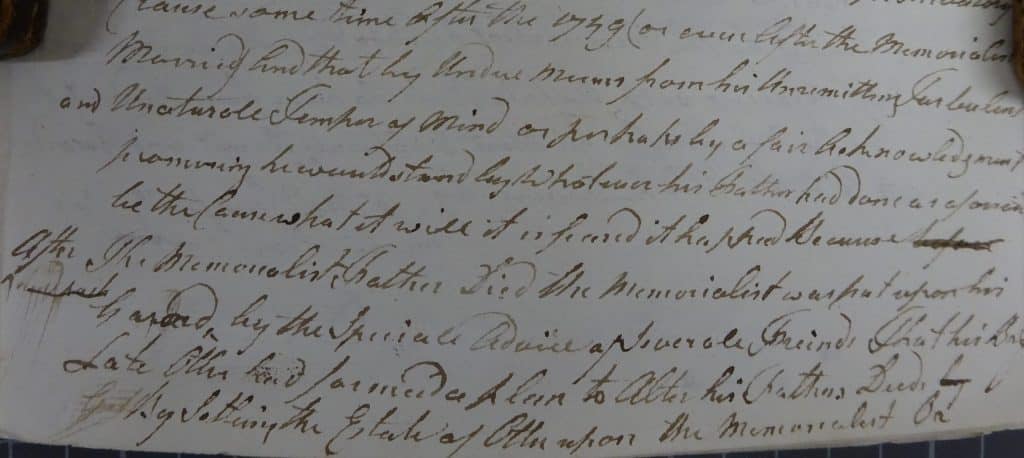
(or even after the Memorialist
Married and that by Undue means from his Unremitting Turbulent
and Unaturall Temper of Mind or perhaps by a fair Acknowledgement
promising he would stand by whatever his Father had done as aforsaid
be the Cause what it will it is feared it happened because
After the Memorialist Father died the Memorialist was put upon his
Garard by the Special Advice of severall Friends That his Brother
Late Otter had formed a plan to Alter his Fathers Deeds
By setting the Estate of Otter upon the Memorialist or
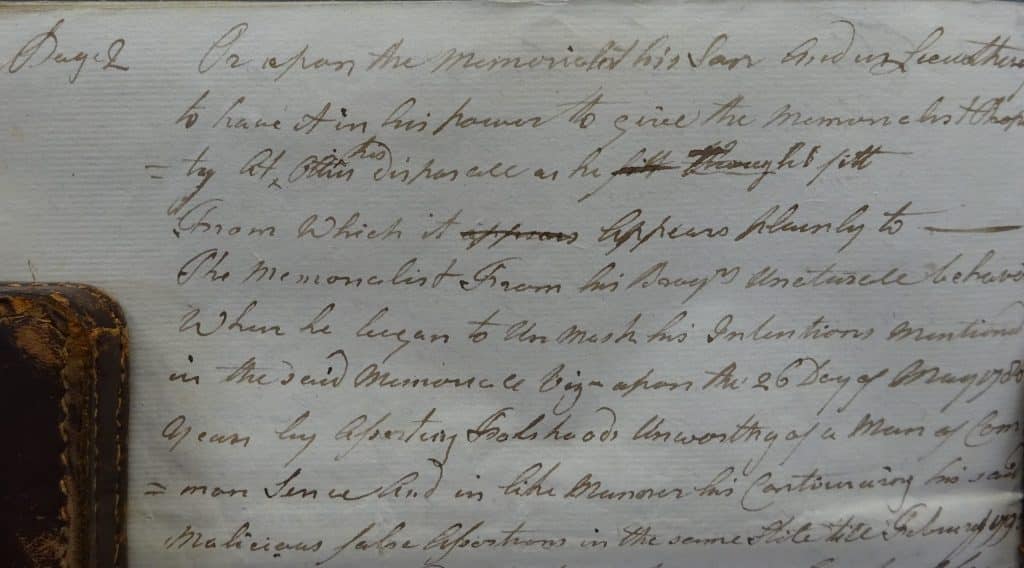
Page 2 Or upon the Memorialist his Son and in Lieu thereof
to have it in his power to give the Memorialist Proper=
=ty At Otter his disposal as he thought fit
From which it appears plainly to ————————–
The Memorialist from his Brothers Unaturall behaviour
When he began to Un mask his Intentions Mentioned
in the said Memoriall Viz upon the 26 Day of May 1789
Years by Asserting Folshoods Unworthy of a Man of Com=
=mon Sence And in like Manners his Continuing his said
Malicious false Assertions in the same State till February 1795
Excerpt 40
Ormidale is determined that anyone reading his memorial should be quite clear on his position, if they hadn’t worked it out already.
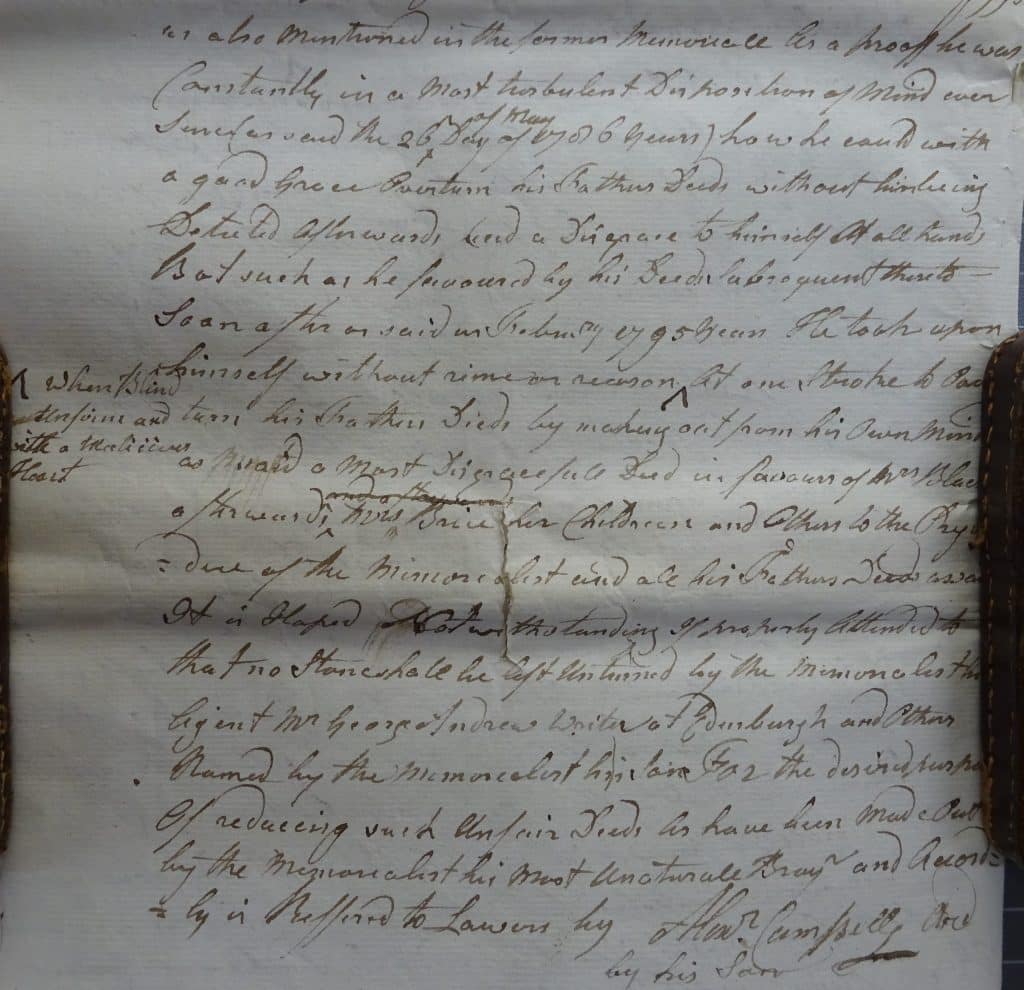
as also Mentioned in the above Memorial As a proof he was
Constantly in a Most turbulent Disposition of Mind ever
Since (as said the 26 Day of May of 1786 years) how he could with
a good grace overturn his fathers deeds without him being
Detected afterwards and a Disgrace to himself At all hands
But such as he favoured by his Deeds Subsequent thereto
sean after as said February 1795 Years He took upon
^When blind himself without rime or reason ^ At one Stroke to Over
Unfirm and turn his Fathers Dieds by making out from his Own Mind
with a malicious as said a Most Disgracefull Died in favour of Mrs Black
Heart afterwards Mrs Bruce her Children and Others to the Priju=
=dice of the Memorialist and all his Fathers Deeds as said
It is Hoped Notwithstanding If properly Attended to
that no Stone shall be left unturned by the Memorialist his
Agent Mr George Andrew Writer at Edinburgh and Others
Named by the Memorialist his son for the desired purpose
Of reducing such Unfair Deeds as have been made Out
by the Memorialist his Most Unaturall Brother and Accord=
=ingly is Reffered to Lawers by
Alexander Campbell Ormidale
by his son
Excerpt 41
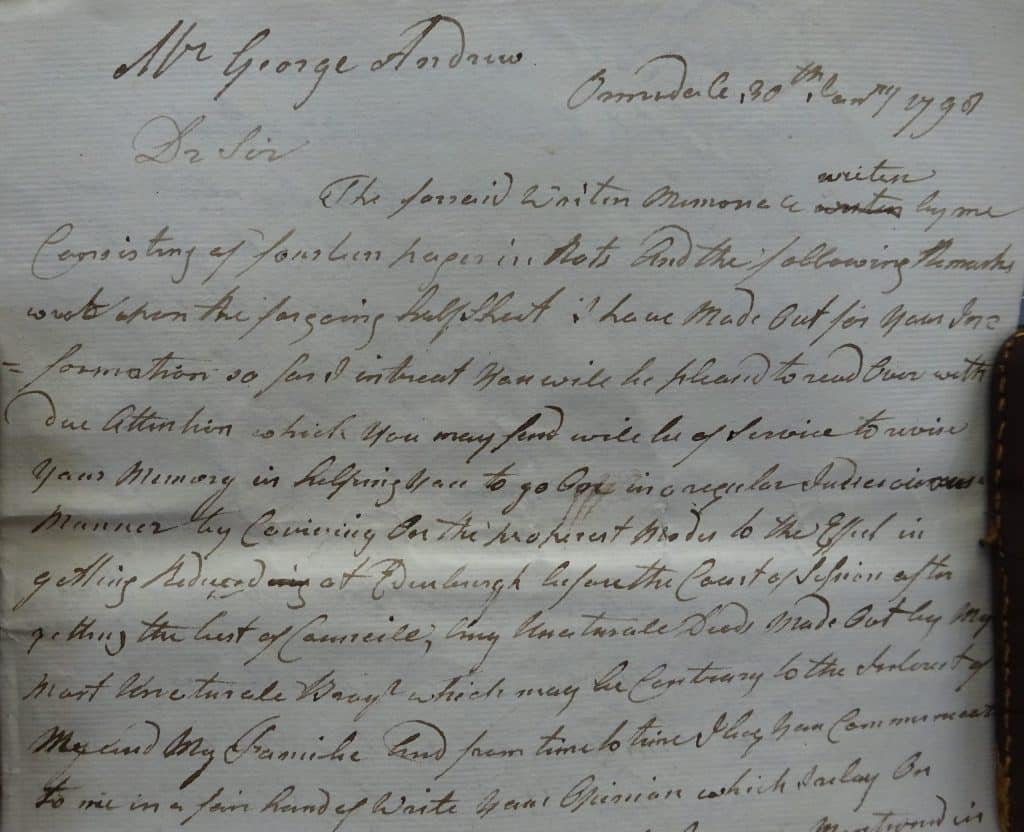
Mr George Andrew
Ormidale, 30th January 1790
Dear Sir,
The forsaid written Memorial written be me
Consisting of fourteen pages in Notes And the following Remarks
wrot upon the forgoing half sheet I have made out for your in=
=formation so far I intrust you will be pleased to read Over with
due attention which you may feel will be of service to revise
Your Memory in helping you to go On in a regular Judicious
Manner by Coviering On the proprest modes to the Effect in
getting Reduced at Edinburgh before the Court of Session after
getting the best of Councill, any Unaturall Deeds Made Out by my
Most Unaturall Brother which may be Contrary to the Interest of
Me and My Familie and from time to time I beg you Communicate
to me in a fair hand of Write Your Opinion which I rely On
Excerpt 42
And now the remainder of the covering letter. Like many of us, Ormidale was concerned about his legal fees mounting up when he was already short of money.
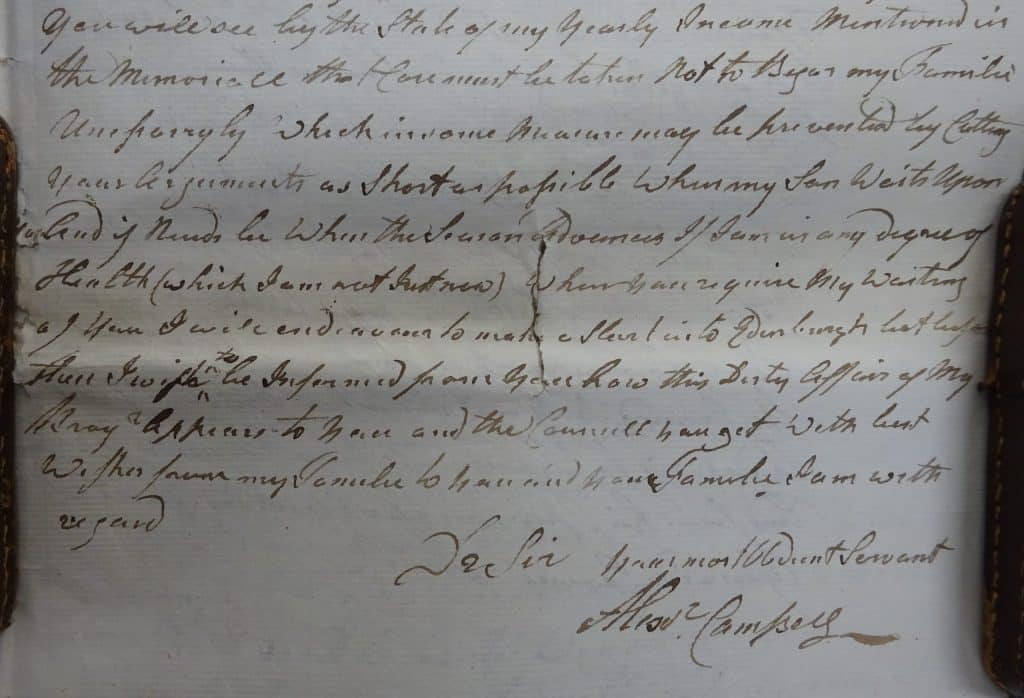
You will see by the State of my Yearly Income Mentioned in
the Memoriall that Care must be taken Not to Begar my Familie
Unessarryly Which in some Measure may be prevented by Cutting
Your Arguments as Short as possible When my Son Waits Upon
You And if Needs be When the Season Advances If I am in any degree of
Health (which I am not Just now) When you require My Waiting
as You I will endeavour to make a start into Edinburgh but before
then I wish to be informed from You how this Dirty Affair of My
Brother appears to you and the Councill you get With best
Wishes from my Familie to You and your Familie I am with
regard
Dear Sir Your Most Obedient Servant
Alexander Campbell
To Mr George Andrew Writer at Edinburgh
Turn Over
Excerpt 43
Ormidale is claiming that Otter had financially mismanaged his estate, to the point where the tenants might struggle to pay their rents if the prices that they could get for their goods dropped.
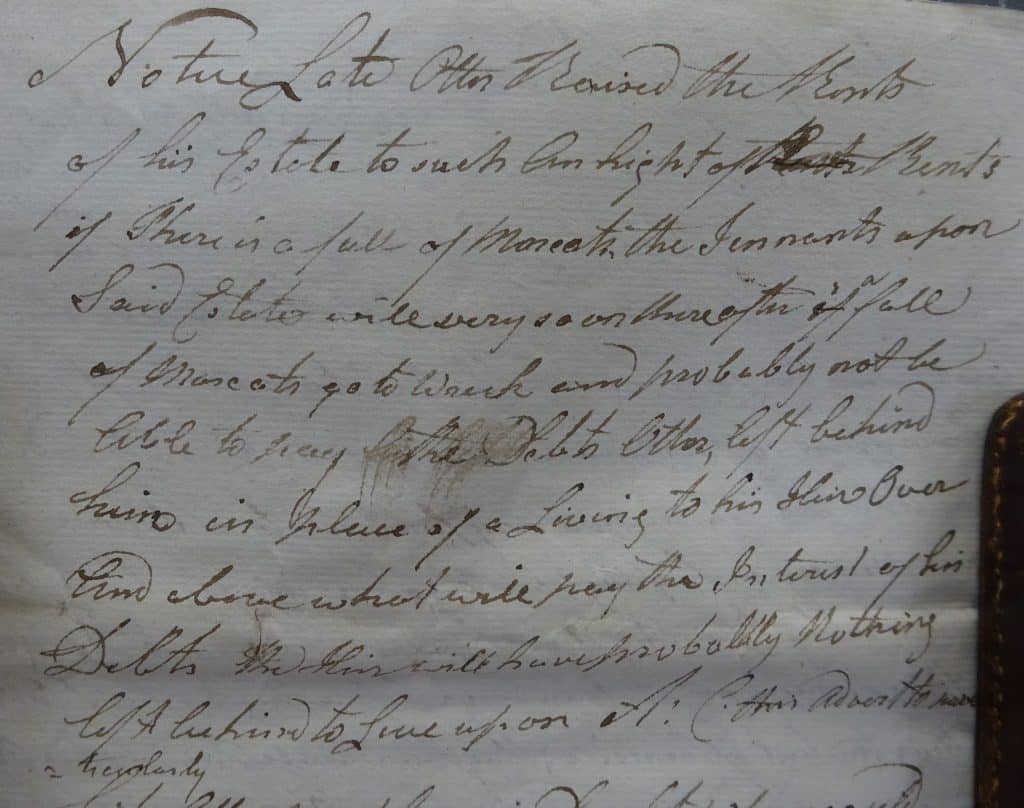
Notice Late Otter Raised the Rents
of his Estate to such An hight of Rents
if There is a fall of Marcats the Tennants upon
Said Estate will very soon thereafter a fall
of Marcats go to Wreck and probably not be
Able to pay for the Debts Otter left behind
him in place of a Living to his Heir Over
And above what will pay the Interest of his
Debts the Heir will have probably Nothing
left Behind to Live upon A: C: this advert to pare=
=ticolarly
Excerpt 44
Here we have more complaints about mismanagement of the estate. We are not quite sure why these are relevant to Ormidale’s case, unless he perhaps thought that it was proof that Otter was not of sound mind?
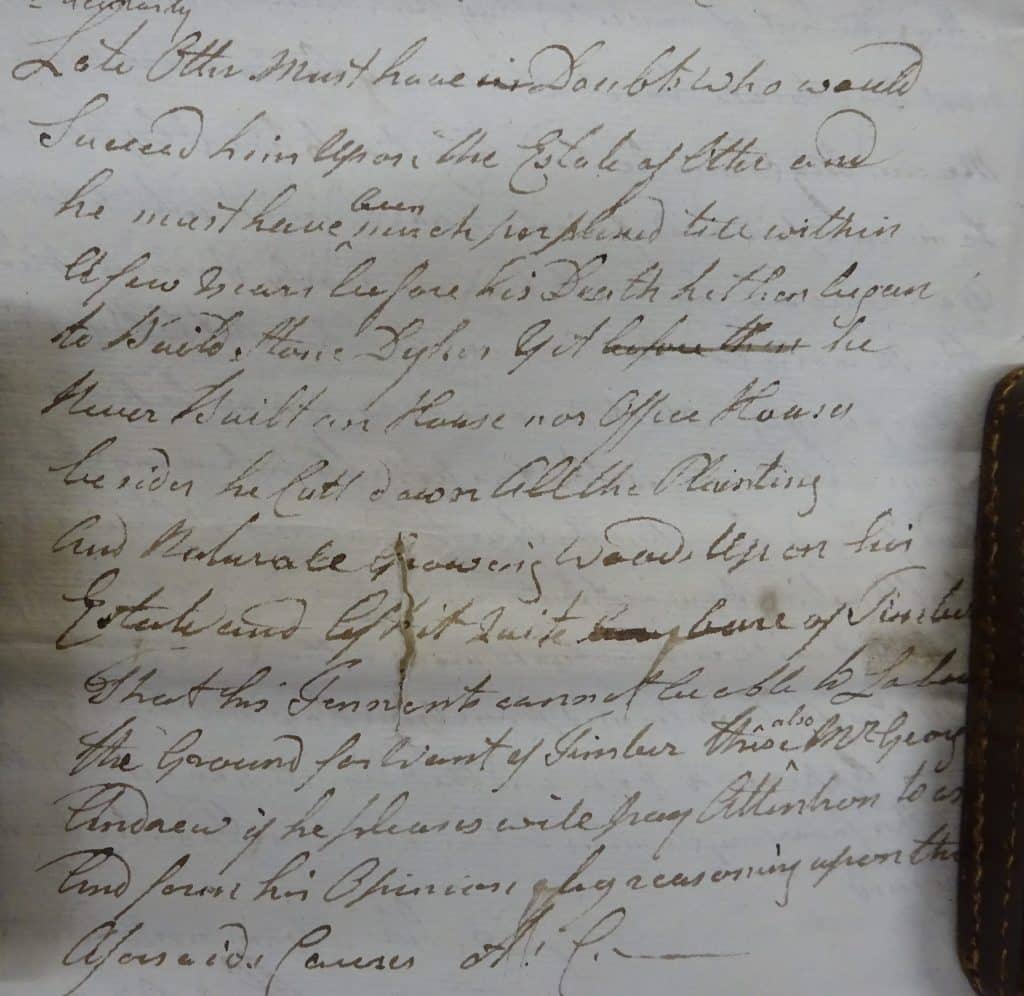
Late Otter must have Doubts who would
Succeed him Upon the Estate of Otter and
he must have been much perplexed till within
A few Years before his Death he then begun
to Build Stone Dykes Yet he
Never Built an House nor Office Houses
besides he Cutt Down All the Planting
And Valuable Growing Woods Up on his
Estate and left it quite bare of Timber
That his Tennants cannot be able to Labour
the Ground for Want of Timber these also Mr George
Andrew if he pleases will pay attention to as said
And form his Opinions by reasoning upon the
Aforsaid Causes A:C:
Excerpt 45
Ormidale is saying here that Otter didn’t bother to fulfil his duty in recruiting men to serve in the Fencible Regiment. These were used to defend the country against invasion and to free up the Regular Army for other duties.
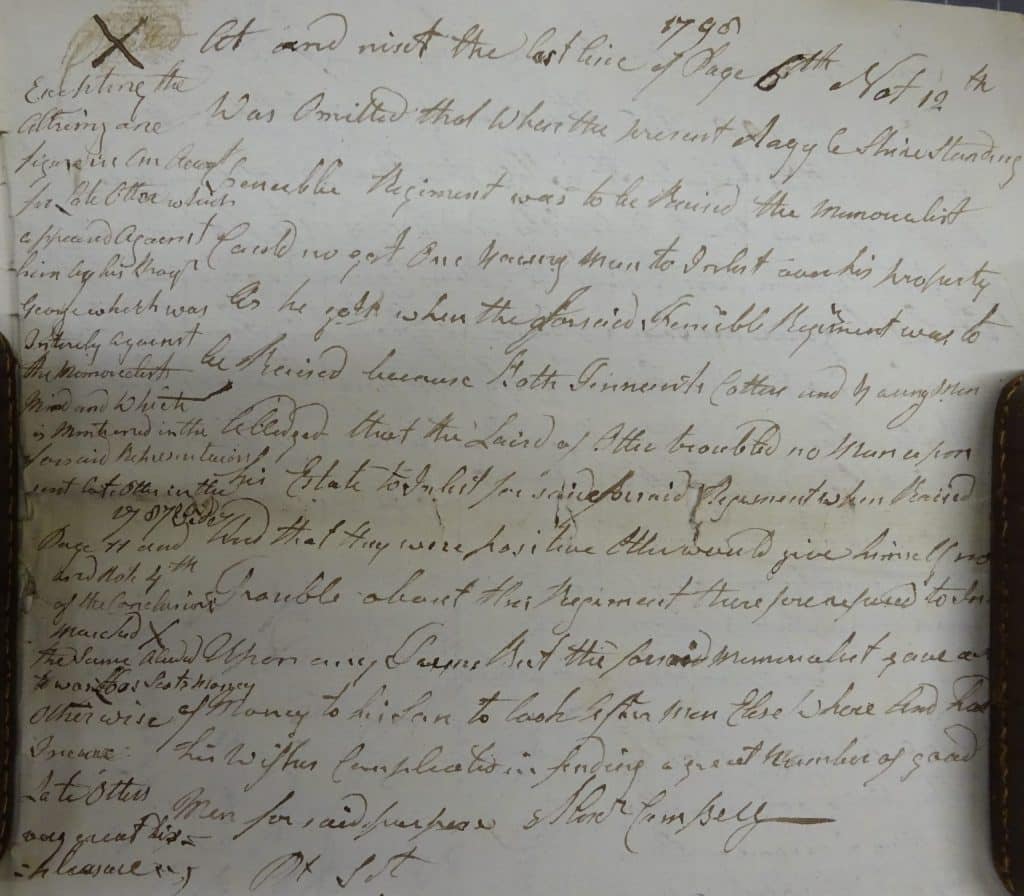
X
Excepting the
Altering Ane
figure in an Accompt
for Late Otter which
appeared against
him by his Brother
George which was
Intirely Against
the Memorialists
Mind and Which
Is Mentioned in the
Forsaid Representation
Sent late Otter in the
1787 Vide
Page 11 and
And Note 4th
of the Conclusion
marked X
the sume Aluded
to was £60 l Scots Money
Otherwise
Incure
Late Otters very great displeasure
1795
At and nixt the last line of Page 6th Not 12th
Was Omitted that when the present Argyleshire Standing
Fencible Regiment was to be Raised the Memorialist
Could no get one Young Man to Inlist over his property
As he got when the Forsaid Fencible Regiment was to
be Raised because Both Tennants Cottars and Young Men
Alledged that the Laird of Otter troubled no Man upon
his Estate to Inlist for said aforsaid Regiment when Raised
And that they were positive Otter would give himself no
Trouble about this Regiment therefore refused to Inlist
Upon any Taxes But the forsaid Memorialist gave a Sum
of Money to his son to look after men Else Where And had
his wishes Complicated in finding a great number of good
Men for said purpose Alexander Campbell
Post Script
Excerpt 46
Ormidale seems to be saying that he fully expects his case to be successful because Otter’s actions are not within the expected norms of society, and there were other options for taking care of Mrs Black’s children.
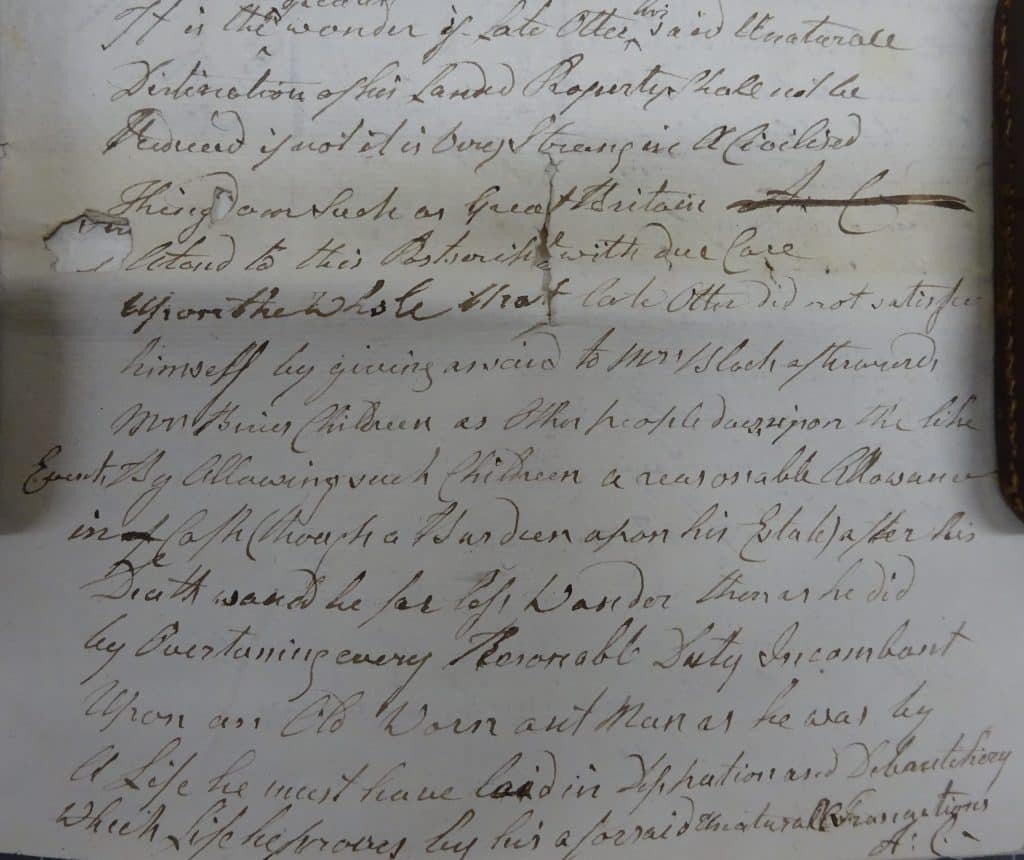
It is the greatest wonder if Late Otter his said Unaturall
Deilination of his Landed Property Shall not be
Reduced if not it is Very Strange in a Civilised
Kingdom as Great Britain
Atend to this Postscript with due Care
Upon the Whole that Late Otter did not satisfie
himself by giving as said to Mrs Black afterwards
Mrs Bruces Children as Other people daes upon the Like
Events by Allowing such Children a Reasonable Allowance
in Cash (though a Burden upon his Estate after his
Death would be far less Wander than as he did
by Overturning every Reasonable Duty Incombant
Upon an Old Worn out Man as he was by
A Life he must have laid in Disipation and Debaritilory
which Life he proves by his aforsaid Unaturall Transactions
A: C:
Excerpt 47
Presumably Ormidale had by this point received a letter from his solicitor saying that nothing could be done.
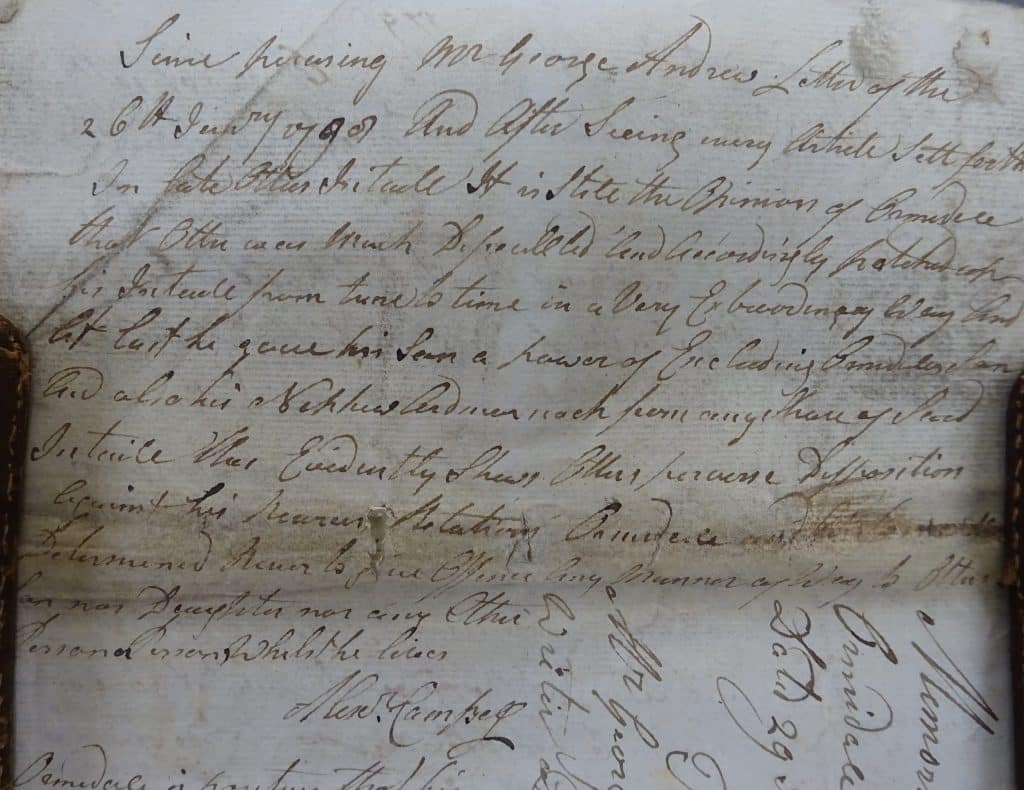
Since perusing Mr George Andrews Letter of the
26th January 1798 And After Seeing every Article Sett forth
In late Otters Intaill It is still the Opinion of Ormidale
that Otter was much Difucullted And Accordingly Patched up
his Intaill from time to time in a Very Extraordinary Way And
At Last he gave his Son a power of excluding Ormidales Son
And also his Nephew Ardmarnock from any share of said
Intaill This Evidently shows Otters persone Disposition
Against his Nearest Relation Ormidale and his Famillie
Determined Never to give Offence Any Manner of Way to Otters
Son nor Daughter nor any Other
Person or Persons Whilst he lives
Alexander Campbell
Excerpt 48
And, one last comment from Ormidale that someone has done something fraudulent.
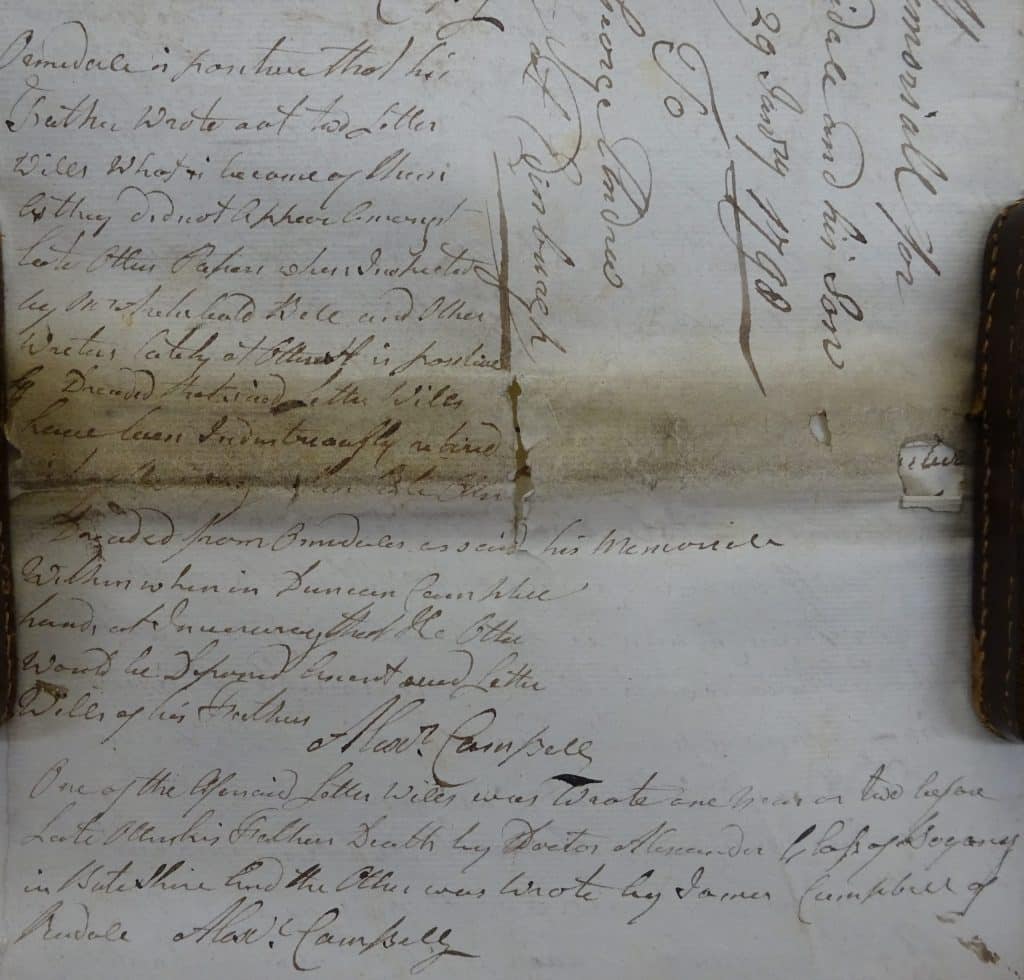
Ormdale is positive that his
Brother Wrote out two Letter
Wills What is become of them
As they did not appear Amongst
late Otters Papers when Inspected
by Mr Archibald Bell and Other
Writers lately at Otter It is positive
ly Dreaded that said Letter Wills
have been Industriously retired
[?] the way when Late Otter
Dacceded from Ormidale as said his Memoriall
Within when in Duncan Campbells
hands at Inveraray that He Otter
Would be Deponed Anent said Letter
Wills of his Fathers
Alexander Campbell
One of the aforesaid Letter Wills was Wrote ane Year or two before
Late Otter his Fathers Death by Doctor Alexander Glass of Bogany
in Buteshire And the Other was wrote by James Campbell of
Rudall
Alexander Campbell
